Edwin O. Reischauer Institute of Japanese Studies
Harvard University

2020-22 Biennial Report
The Edwin O. Reischauer Institute of Japanese Studies at Harvard University supports research on Japan and provides a forum for related academic activities and the exchange of ideas, bringing together Harvard faculty and students, as well as scholars and visitors from other institutions, to create one of the world’s leading communities for the study of Japan.
Our Goals
• Cooperate with the Asia Center and other related programs at Harvard to increase the public’s understanding of Japan and Asia in the United States and abroad
• Expand and enrich research and teaching on Japan throughout the University
• Strengthen the ties between Harvard University and Japan
Edwin O. Reischauer Institute of Japanese Studies
Harvard University Center for Government and International Studies, South Building 1730 Cambridge Street, Cambridge, Massachusetts 02138
Phone 617.495.3220
Fax 617.496.8083
Email rijs@fas.harvard.edu
Website https://rijs.fas.harvard.edu/
2
Abbreviation Key
CES Minda de Gunzberg Center for European Studies
CGIS Center for Government and International Studies
CSWR Center for the Study of World Religions
Davis Davis Center for Russian and Eurasian Studies
DRCLAS David Rockefeller Center for Latin American Studies
EALC East Asian Languages and Civilizations
EALS East Asian Legal Studies Program
EAS East Asian Studies (Undergraduate Concentration)
Fairbank Fairbank Center for Chinese Studies
FAS Faculty of Arts and Sciences
GSAS Graduate School of Arts and Sciences
GSD Graduate School of Design
GSE Graduate School of Education
HAA History of Art and Architecture Department
HBS Harvard Business School
HBSF Harvard Buddhist Studies Forum
HDS Harvard Divinity School
HEAL History and East Asian Languages (Ph.D. Concentration)
HKS Harvard Kennedy School
HSPH Harvard School of Public Health
HSS Harvard Summer School
HUAC Harvard University Asia Center
HYI Harvard-Yenching Institute
HYL Harvard-Yenching Library
JDA Japan Digital Disasters Archive
JDRC Japan Digital Research Center
KI Korea Institute
RIJS Reischauer Institute of Japanese Studies
RSEA Regional Studies-East Asia (A.M. Program)
SAI South Asia Institute
USJP Program on U.S.-Japan Relations
VES Visual and Environmental Studies Department
WCFIA Weatherhead Center for International Affairs
Contents About the Institute Edwin O. Reischauer ................................................... 2 Home in CGIS 3 RIJS Director .................................................................. 4 Committees of the Institute .................................... 4 Faculty Announcements 6 RIJS Website .................................................................. 9 Note on Covid-19 Pandemic Impact .................... 9 Advancing Research in Japanese Studies Support for Faculty Research ............................... 10 Visiting Scholars ........................................................ 11 Japan Digital Fellow ................................................ 12 Postdoctoral Fellows ............................................... 12 Graduate Student Associates-in-Residence 13 Japan Forum .............................................................. 14 Other Seminars ......................................................... 18 Conferences, Symposia, Workshops 23 Publications ................................................................ 25 Program on U.S.-Japan Relations ....................... 26 Harvard’s Libraries 27 Digital Initiatives ....................................................... 28 Japan Digital Research Center ............................. 28 Constitutional Revision 28 Japan Disasters Digital Archive ........................... 29 Supporting Harvard’s Educational Mission Programs for Harvard Undergraduates ............ 30 Undergraduate Japan Experience 2020-22 36 Support for Graduate Student Training ........... 37 Graduate Research and Training 2020-22 ....... 40 Curriculum and Teaching ...................................... 42 Courses on Japan at Harvard 2020-22 .............. 43 Ties to
Building Networks on Campus ............................ 46 Fostering Networks in the Community 48 Associates in Research............................................ 48 Administration 65
the Community
About the Institute
Established in 1973 as the Japan Institute, the Reischauer Institute of Japanese Studies (RIJS) was renamed in 1985 to commemorate the retirement of Edwin O. Reischauer. The Institute is one of Harvard’s international and regional centers, all of which operate under a mandate to contribute to the university as a whole. Administratively, the Institute reports to the FAS Dean. Since 1997, the Institute has been part of the Harvard University Asia Center (HUAC) and has coordinated closely with HUAC and other associated units. Members of the RIJS Executive Committee also serve on the HUAC Executive Committee and Steering Committee.
Edwin O. Reischauer
October 1910-September 1990
Edwin Oldfather Reischauer was born and raised in Tokyo, the son of Presbyterian educational missionaries. At sixteen, he left Japan for Oberlin College, later taking up graduate work at Harvard where he studied East Asian history, including a five-year world study tour to Paris, Tokyo, Kyoto, and Beijing. He returned to Harvard with his wife Adrienne in 1938, received his Ph.D. in 1939, and taught in the Department of Far Eastern Languages until 1941, when the State Department and the Army recruited him to serve variously as a research analyst, organizer of Japanese language programs for the military, and translator of intercepted military intelligence. After his return to Harvard in 1946, Reischauer guided the development of a new curriculum in East Asian Studies and began his career as a prolific writer. It was during this “golden age” of teaching (to use his phrase) that he began his collaboration with John K. Fairbank to teach a course on East Asian Civilizations, nicknamed “Rice Paddies,” which is still taught today as part of the General Education curriculum.
An article written by Reischauer in 1960 analyzing current tensions between the U.S. and Japan caught the attention of U.S. President John F. Kennedy, who appointed Reischauer as ambassador to Japan (1961-1966). Key to Reischauer’s ambassadorial outlook was the notion of “equal partnership” between Japan and America. He and his second wife, Haru Matsukata, a journalist from Tokyo whom he had married after Adrienne’s death in 1955, gave priority to their ties with ordinary Japanese citizens and were enthusiastically received. Both professionally and personally, Haru was a supportive companion to her husband and a strong partner to him as ambassador and scholar.
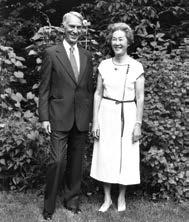 Edwin O. Reischauer, pictured here with his wife, Haru.
Edwin O. Reischauer, pictured here with his wife, Haru.
2
Returning to Harvard in 1966 as a University Professor, Reischauer continued to teach “Rice Paddies” and, reflecting his growing interest in contemporary issues, developed a course on Japanese Government and Politics in the Government Department and participated in a History Department course on The United States and East Asia. Reischauer wrote many books, including East Asia: Tradition and Transformation (1973), co-authored with John K. Fairbank and Albert M. Craig. He was the prime mover in establishing and funding the Japan Institute, later renamed in his honor, and he served as its director from 1974 to 1981. Up until his retirement in 1981, he continued to teach, write, and initiate a myriad of projects to enhance relations between the U.S. and Japan, including producing a series of lectures on Japanese history on videotape for the University.
Reischauer was instrumental in expanding not only Harvard’s curriculum but the field of East Asian studies as a whole, deepening American consciousness of Japan and the outside world. All of these contributions continue today to guide the Institute that gratefully carries his name.

Home in CGIS
Since 2005, the Reischauer Institute of Japanese Studies has been housed in the Center for Government and International Studies (CGIS), a complex designed to promote the crossing of boundaries and the forming of connections. RIJS shares the second floor of the CGIS South Building with the Korea Institute (KI) and the David Rockefeller Center for Latin American Studies (DRCLAS), and the Asia Center and many other Asiarelated programs are located nearby. Through CGIS, faculty, students, postdoctoral fellows, visiting scholars, and staff are seamlessly integrated into the dynamic international studies community at Harvard.
The spaces in CGIS South provided to graduate student associates-in-residence (GSAs), postdoctoral fellows, and visiting scholars promote interdisciplinary and cross-regional interaction. Each of the building’s four floors contains space with carrels assigned to graduate students affiliated with a regional studies institute and/ or department. GSAs from different centers are mixed together, allowing for exciting academic exchange. RIJS postdoctoral fellows share office space with “postdocs” from other centers who have similar research interests. The postdocs enjoy a broader intellectual environment, and those who study more than one Asian country greatly benefit from proximity to other programs. Occupying a shared space, RIJS visiting scholars also have the opportunity to exchange ideas on various research topics, from political science to visual arts, literary studies to technology.
In addition, CGIS South regularly features contemporary and traditional art exhibitions on the Japan Friends of Harvard Concourse. Those hosted by RIJS include: Irresolution: The Paintings of Yoshiaki Shimizu (2017), From Artistry to Ethnography (2015), The Thinking Hand: Tools and Traditions of the Japanese Carpenter (2014), Tomokazu Matsuyama | Palimpsest (2013), Mizue Sawano | Eternal Return (2011), and Mitsuko Asakura | Tapestry in Architecture: Creating Human Spaces (2008).
RIJS Director
Mary C. Brinton, Reischauer Institute Professor of Sociology serves as Faculty Director of the Reischauer Institute. Professor Brinton is also a Faculty Associate at the Weatherhead Center for International Affairs and former Chair of the Harvard Department of Sociology (2010-2016). She joined the Harvard faculty in 2003, having previously taught at the University of Chicago for twelve years and at Cornell University for four years.
Professor Brinton’s research and teaching focus on gender inequality, labor markets and employment, social demography, and contemporary Japanese society. Her research combines qualitative and quantitative methods to study institutional change and its effects on individual action, particularly in labor markets. She generally engages in primary data collection for her research projects and has designed social surveys, interviews, and observational studies in Japan and Korea. Professor Brinton studied sociolinguistics as an undergraduate at Stanford University, and she earned an M.A. in Japanese Studies and an M.A. and Ph.D. in Sociology at the University of Washington.
Interim Director
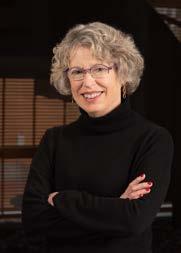
During Fall Term 2020, Professor Karen L. Thornber, Harry Tuchman Levin Professor in Literature and Professor of East Asian Languages and Civilizations, served as the Acting Director. Professor Thornber had previously served as Victor and William Fung Director of the Harvard University Asia Center, Chair of the Department of Comparative Literature, Chair of Regional Studies East Asia, and Director of Graduate Studies for both Comparative Literature and Regional Studies East Asia. She was also a member of the 20192020 Harvard Provost’s Academic Leadership Forum.
Committees of the Institute
The Full Committee (FC) carries out the core mission of RIJS. The FC is composed of tenured professors, junior faculty, and emeritus faculty from across the University whose research and teaching relate to Japan, as well as Japanese language faculty and librarians for the Japanese collections. The committee meets at least once annually, and its members participate actively in RIJS activities and subcommittees.
The Executive Committee (EC), the governing body of the Institute, is composed of 16 tenured faculty appointed from the FC by the FAS Dean. Membership recommendations for this committee are submitted annually to the Dean for approval. The EC meets four to six times per year to consider new initiatives, approve the annual budget, make formal and informal appointments, award fellowships and grants, and establish Institute policies and procedures.
4
The RIJS Full Committee 2020-22
Please see below for the names and titles of RIJS Full Committee members, which appear throughout this report. An asterisk (*) indicates members of the Executive Committee.
Ryūichi Abé, EALC*
Reischauer Institute Professor of Japanese Religions
David C. Atherton, EALC
Assistant Professor of East Asian Languages and Civilizations
Naomi Asakura, EALC Preceptor in Japanese
Theodore C. Bestor, Anthropology*
Reischauer Institute Professor of Social Anthropology and Japanese Studies (until 2021)
Mary C. Brinton, Sociology*
Reischauer Institute Professor of Sociology; Director of RIJS
Albert M. Craig, EALC
Harvard-Yenching Professor of History Emeritus (until 2021)
Edwin A. Cranston, EALC*
Professor of Japanese Literature Emeritus (until 2021)
Christina L. Davis, Government*
Professor of Government; Susan S. and Kenneth L. Wallach Professor, Radcliffe Institute; Director of USJP, WCFIA
John M. Doyle, Physics
Henry B. Silsbee Professor of Physics
Theodore J. Gilman, WCFIA Executive Director of WCFIA
Andrew D. Gordon, History* Lee and Juliet Folger Fund Professor of History
Tomoko Graham, EALC Preceptor in Japanese
Helen Hardacre, EALC*
Reischauer Institute Professor of Japanese Religions and Society
Takao K. Hensch, MCB Professor of Molecular and Cellular Biology; Professor of Neurology, Children’s Hospital
David L. Howell, EALC*
Robert K. and Dale J. Weary Professor of Japanese History
Akira Iriye, History
Charles Warren Professor of American History Emeritus
Kosuke Imai, Government Professor of Government and Statistics
Wesley M. Jacobsen, EALC* Professor of the Practice of the Japanese Language; Director of the Japanese Language Program
Geoffrey G. Jones, HBS
Isidor Straus Professor of Business History
Yuko Kageyama-Hunt, EALC Senior Preceptor in Japanese
Ichiro Kawachi, HMS / HSPH
John L. Loeb and Frances Lehman Professor of Social Epidemiology
Susumu Kuno, Linguistics Professor of Linguistics Emeritus
Shigehisa Kuriyama, EALC*
Reischauer Institute Professor of Cultural History; Harvard College Professor
Yukio Lippit, HAA*
Jeffrey T. Chambers and Andrea Okamura Professor of History of Art and Architecture; Harvard College Professor
Melissa McCormick, EALC*
Andrew W. Mellon Professor of Japanese Art and Culture
Kuniko McVey, HYL Librarian for the Japanese Collection
Ian J. Miller, History* Professor of History
Miki Miyagawa, EALC Drill Instructor in Japanese
Toshiko Mori, GSD
Robert P. Hubbard Professor in the Practice of Architecture
David R. Odo, Harvard Art Museums Director of Student Programs; Research Curator of University Collections Initiatives
Susan J. Pharr, Government*
Edwin O. Reischauer Professor of Japanese Politics
J. Mark Ramseyer, HLS*
Mitsubishi Professor of Japanese Legal Studies
Michael R. Reich, HSPH
Taro Takemi Professor of International Health Policy
James Robson, EALC
James C. Kralik and Yunli Lou Professor of East Asian Languages and Civilizations; Victor and William Fung Director of HUAC; Harvard College Professor
Henry Rosovsky, Economics
Lewis P. and Linda L. Geyser University Professor Emeritus
Jay Rubin, EALC
Takashima Professor of Japanese Humanities Emeritus
Victor Seow, History of Science
Assistant Professor of the History of Science
Daniel M. Smith, Government Associate Professor of Comparative Politics
Chikako Takehara, EALC Drill Instructor in Japanese
Hirotaka Takeuchi, HBS Professor of Management Practice
Karen L. Thornber, Comp Lit*
Henry Tuchman Levin Professor in Literature; Professor of East Asian Languages and Civilizations
Ezra F. Vogel, Sociology
Henry Ford II Professor of the Social Sciences Emeritus (until 2020)
Mihoko Yagi, EALC Drill Instructor in Japanese (2019-20)
Tomiko Yoda, EALC* Takashima Professor of Japanese Humanities
Michael Y. Yoshino, HBS
Herman C. Krannert Professor of Business Administration Emeritus
Alexander Zahlten, EALC Professor of East Asian Languages and Civilizations
5
Faculty Announcements
William M. Tsutsui appointed Edwin O. Reischauer Distinguished Visiting Professor of Japanese Studies
For the 2020-21 academic year, William M. Tsutsui was appointed Edwin O. Reischauer Distinguished Visiting Professor of Japanese Studies. Educated at Harvard, Oxford, and Princeton Universities, Professor Tsutsui is a specialist in the economic, environmental, and cultural history of modern Japan. He is currently Professor Emeritus of History at Hendrix College. At Harvard, he taught EASTD 115 “Japanese Monsters” and co-taught HIST 2651 “Research Seminar in Japanese History” with Andrew D. Gordon.
During his time at Harvard, he was also featured in numerous guest lectures and interviews, including Idaho Humanities Council, Japan-America Society of Greater Austin, Japan-America Society of Dallas/Fort Worth, Tulsa Global Alliance and Tulsa-Utsunomiya Sister City Partnership, Asia Global Online, Federation of State Humanities Councils, The New York Times, and The Harvard Gazette
Alexander Zahlten promoted to Professor of East Asian Languages and Civilizations
In September 2020, Alexander Zahlten was promoted to Professor of East Asian Languages and Civilizations. Professor Zahlten’s research interests center on film and audiovisual culture in East Asia, with a focus on Japan. His recent works include his monograph The End of Japanese Cinema: Industrial Genres, National Times, and Media Ecologies (Duke University Press, 2017), which maps the transformations of the film (and media) industry in Japan from the 1960s-2000s, and a co-edited volume Media Theory in Japan (Duke University Press, 2017).
Andrew D. Gordon awarded NIHU International Prize in Japanese Studies
In October 2020, Andrew Gordon was awarded the second annual NIHU International Prize in Japanese Studies by the National Institute for the Humanities, in recognition of his wide-ranging research activities and outstanding achievement in the study of the history of labor in modern Japan, in the study of Japanese modern history, and in education, as well as his contributions to bridging society and academia, namely the Japan Digital Disasters Archive Project. The NIHU broadcasted a press conference in November 2020 and held an award ceremony and commemorative lecture titled “The Excitement of History and Responsibility of Historical Studies” (“歴史の魅力・歴史学の責任”) in June 2021.
During the 2020-21 academic year, Professor Gordon was also featured in The New York Times as a specialist in the history of labor in Japan, commenting on the history and trends of the employment of regular and nonregular workers in Japan. He also published several articles including a historical analysis of Covid-19 policies in Japan and Asia for Tokyo College (University of Tokyo) and a 3.11 10th Anniversary Commemorative article for Nikkei Shimbun.
Wesley M. Jacobsen publishes co-edited volume The Handbook of Japanese Semantics and Pragmatics
In October 2020, Wesley Jacobsen published a co-edited volume, titled The Handbook of Japanese Semantics and Pragmatics (De Gruyter Mouton), with Yukinori Takubo (Kyoto University). This volume is a collection of studies on linguistic meaning in Japanese, representing a range of ideas and approaches that are influential in the fields of semantics and pragmatics.
6
Christina L. Davis interviewed by Asahi Shimbun to discuss 2020 U.S. election
In November 2020, Christina Davis was interviewed by the Asahi Shimbun, for an article titled “トラン プ→バイデン でも、バラ色の世界は戻ってこない” [“Trump to Biden: but no return to a rosecolored world”]. In this article, Professor Davis predicted the new Biden adniminstration’s policy, including strengthening measures against Covid-19, promoting economic stimulus, moving away from the U.S. unilateralism formerly promoted by the Trump administration, and negotiating the expansion of trade agreements with Japan and Europe. She also predicted that the Biden administration would encourage gradual, but not immediate, change in trade policy with China.
Toshiko Mori designs paper house model for The New York Times
In March 2021, Toshiko Mori was featured in The New York Times for designing a paper house model, in response to a challenge posed by The New York Times Style Magazine to a select group of architects to design a paper house model that represents their vision of post-pandemic domestic architecture. Professor Mori created her model based on her previous work in rural Senegal (2015-19), utilizing round shapes to promote ventilation and maximize space. The full article, along with the downloadable paper house designs, can be found here
Helen Hardacre publishes co-edited volume Japanese Constitutional Revision and Civic Activism
In June 2021, Helen Hardacre published a co-edited volume, titled Japanese Constitutional Revisionism and Civic Activism (Lexington Books), with fellow committee members of the Project on Constitutional Revision in Japan, Timothy S. George (University of Rhode Island), Keigo Komamura (Keio University), and Franziska Seraphim (Boston College). This volume contains a collection of essays that examine the history of Japan’s constitution, including one contributed by Professor Hardacre, “Nippon Kaigi Working for Constitutional Revision.”
Melissa McCormick named Andrew W. Mellon Professor of Japanese Art and Culture
In July 2021, Melissa McCormick was named to an endowed professorship, Andrew W. Mellon Professor of Japanese Art and Culture. Professor McCormick’s research focuses on the relationship of art and literature, as well as forms of visual storytelling, and their integration with social and political history and Buddhist thought. She also teaches a range of courses for undergraduate and graduate students from introductory surveys on the arts of Japan spanning the premodern to the contemporary, to seminars such as “Gender and Japanese Art,” “The Tale of Genji in Word and Image,” and “Medieval Picture Scrolls.”
Andrew D. Gordon and Michael R. Reich publish articles on vaccine hesitancy and Tokyo Olympics
In August 2021, Andrew Gordon and Michael Reich co-authored an article titled “The Puzzle of Vaccine Hesitancy in Japan,” published in the Journal of Japanese Studies. A Japanese translation “日本におけるワク チン不信を巡る謎” was also published in the Japanese journal 医学のあゆみ. They were later featured on the podcast “Japan on the Record” by Tristan Grunow (Pacific University, former RIJS Postdoctoral Fellow), in which they discussed their article and reflected on what lessons from Japan’s history of vaccines can be applied to future pandemics.
In September 2021, as an extension of their vaccine hesitancy research, Professors Gordon and Reich cowrote an article, “Japan’s Political Hesitancy Created a Sad Summer Olympics,” which was featured by the Weatherhead Center for International Affairs on their blog “Epicenter.”
7
Susan J. Pharr featured in Mainichi Shimbun, Nikkei Shimbun, and NHK News, for efforts to petition for student visas to Japan
In January 2022, Susan Pharr and several other scholars and students from Harvard and other universities around the world began a petition to Japan Prime Minister Fumio Kishida, urging the Japanese government to resume issuing visas for research and study. On 21 January 2022, prior to a virtual meeting between U.S. President Biden and Japan Prime Minister Kishida, Professor Pharr chaired a press conference hosted by the Japan Society in New York, in which scholars exchanged opinions on the current situation. These efforts were featured in the Mainichi Shimbun, Nikkei Shimbun, NHK News, among other major news sources.
Victor Seow publishes monograph Carbon Technocracy: Energy Regimes in Modern East Asia
In March 2022, Victor Seow published a monograph Carbon Technocracy: Energy Regimes in Modern East Asia (University of Chicago Press). Using the history of the Fushun coal mine in Northeast China as a case study, this book discusses the impact of energy extraction projects on twentieth-century China, Japan, and East Asia as a whole.
In Memoriam
With great sadness, the Reischauer Institute notes the passing of Professor Ezra F. Vogel (December 20, 2020), Professor Theodore C. Bestor (July 1, 2021), Professor Albert M. Craig (December 1, 2021), and Professor Edwin A. Cranston (December 8, 2021)
Professor Ezra F. Vogel (1930-2020) was the Henry Ford II Professor of the Social Sciences at Harvard. He received his B.A. from Ohio Wesleyan University in 1950 and then Ph.D. in Sociology from Harvard in 1958. He began teaching at Harvard as a lecturer in 1964, then as professor in 1967. During his time at Harvard, he served as Director of the Fairbank Center from 1973-75 (then titled East Asian Research Center) and again from 1995-99, as well as Founding Director of the Program on U.S.-Japan Relations from 1980-87 and Founding Director of the Asia Center from 1997-99.
Professor Vogel was a teacher, mentor, colleague, and friend to the Japanese studies community at Harvard and to countless others in the U.S., Japan, China, and beyond. His accomplishments earned him enormous respect as a scholar and teacher of contemporary Japanese society and of politics in China and East Asia. His vast knowledge, his humility, his generosity, and his spirit will be greatly missed.
Professor Theodore C. Bestor (1951-2021) was the Reischauer Institute Professor of Social Anthropology and Japanese Studies at Harvard. He was a specialist on contemporary Japanese society and culture; much of his research focused on Tokyo, and he wrote widely on urban culture and history, local neighborhood society and identity, markets and economic organization, and food culture as defining aspects of urban Japanese life. Since joining the faculty in 2001, he served as Chair of the Department of Anthropology (2007-12) and as Director of the Reischauer Institute of Japanese Studies (2012-14, 2015-18). He also served as President of the Association for Asian Studies (2012-13) and was the founding president of the Society for East Asian Anthropology. Professor Bestor was and continues to be widely known for his scholarship and contributions to Japanese studies, as well as the connections he made between Harvard, Japan, and around the world. He will be greatly missed.
10 8
Professor Albert M. Craig (1927-2021) was the Harvard-Yenching Professor of History at Harvard. He received his doctorate at Harvard under the supervision of Edwin O. Reischauer, with whom he taught the “rice paddies” survey course that continues to this day. He was one of the founding members of the Reischauer Institute and served as Director from 1983-1985. After his retirement in 1987, he remained an active member of the Japanese Studies community on campus. He was advisor, mentor, and friend to many scholars and visitors during his many decades of research and teaching at Harvard, and his presence will be greatly missed.
Professor Edwin A. Cranston (1932-2021) was the Professor of Japanese Literature at Harvard. He received his doctorate at Stanford University and joined the Harvard faculty in 1965, retiring in 2020. Throughout his long career, he trained a generation of scholars to read classical Japanese, conveyed the beauty of Japanese in his courses on Nara and Heian court literature, and introduced many undergraduates to the wonders of Japanese poetry in his popular Freshman Seminar. Professor Cranston served as EALC Department chair from 1981-87 and was one of the founding members of the Reischauer Institute. He was a distinguished scholar, gifted poet and translator, and a valued mentor and friend. He will be greatly missed.
RIJS Website
Established in 2005 and renewed in 2018, the RIJS website provides an overview of the Institute’s faculty, scholars, and students; grants and fellowships; events, programs, and activities; digital initiatives; publications; and other resources.
Visit the RIJS website at: https://rijs.fas.harvard.edu.
Covid-19 Pandemic Impact on Institute Operations
On 12 March 2020, the World Health Organization declared Covid-19 a global pandemic, and beginning on 16 March 2020, Harvard University announced a transition to virtual instruction. Following university guidance, the Institute also began a remote work period in response to the unfolding situation, which continued through the 2020-21 academic year.
Beginning on 2 August 2021, the university announced a return to campus, and the Institute transitioned to hybrid operations for the 2021-22 academic year, while continuing to hold most events and meetings online.
11
9
Advancing Research in Japanese Studies Advancing Research
Since its founding in 1973, the Reischauer Institute of Japanese Studies has sought in a variety of ways to promote and support research on Japan in all fields and disciplines across the University.
In addition to supporting Harvard faculty, RIJS creates professorships to bring in faculty from new or underrepresented fields. The research community built at Harvard includes not only faculty and students, but also leading visiting scholars, postdoctoral fellows, and, since 2005, graduate student associates-in-residence. RIJS organizes and/or sponsors seminars, conferences, colloquia, collaborative projects, and other activities that contribute to the exchange of ideas, while also supporting the WCFIA Program on U.S.-Japan Relations, which fosters social science research that bears on Japan’s role in the world as an advanced industrial society. Finally, RIJS maintains a dynamic publications program that has produced a number of prize-winning books, provides major support to the Japanese language collection in the Harvard Libraries, and undertakes numerous initiatives including the Japan Digital Research Center.
Support for Faculty Research
Professorships
Over the past two decades, the Institute has played a prominent role in building Harvard’s intellectual infrastructure for the study of Japan through creating professorships in the Faculty of Arts and Sciences (FAS). No other Japanese Studies program in the world has done more to create or support new faculty positions. These positions are intended to be incremental and are normally funded through the Institute’s endowment. Thus, the Institute owes much gratitude to its many friends in Japan who provided the original endowment funding in support of building Japanese Studies at Harvard.
The current RIJS faculty appointments are as follows:
›› Edwin O. Reischauer Professor of Japanese Politics: Susan J. Pharr
›› Reischauer Institute Professor of Cultural History: Shigehisa Kuriyama
›› Reischauer Institute Professor of Japanese Religions: Ryūichi Abé
›› Reischauer Institute Professor of Japanese Religions and Society: Helen Hardacre
›› Reischauer Institute Professor of Social Anthropology and Japanese Studies: Theodore C. Bestor
›› Reischauer Institute Professor of Sociology: Mary C. Brinton
›› Professor of East Asian Languages and Civilizations: Alexander Zahlten
›› Associate Professor of Government: Daniel M. Smith (2020-21)
10
Edwin O. Reischauer Professorship in Japanese Studies
The terms of the Institute’s endowment also provide for a professorship, named for Edwin O. Reischauer following his retirement in 1980. Intended to contribute directly to faculty research and to the educational mission of the University, the professorship allows FAS senior faculty in Japanese Studies to devote up to one academic year to full-time research at some point during their tenure at Harvard. Normally, in alternating years, the Institute offers appointment as a visiting professor to a leading scholar in Japanese Studies. Visiting professors divide their time between research and teaching, offering two courses over the academic year, including at least one lecture course at the undergraduate level.
In 2020-21, William M. Tsutsui, Professor of History and President of Hendrix College, joined Harvard University as the Edwin O. Reischauer Distinguished Visiting Professor.
There were no Edwin O. Reischauer Professors in 2021-22.
Visiting Scholars
Visiting scholars are a vital part of the Reischauer Institute of Japanese Studies and the research community at Harvard. Their appointments vary widely from a few months to two years, with most staying for one year. During their stay, they collaborate with faculty or contribute directly to ongoing research endeavors at RIJS; advise students and provide contacts for Harvard undergraduate and graduate students preparing to conduct research abroad; give lectures and speak in classes; and participate in seminars and other research activities.
Student Host Program for Visiting Scholars
RIJS seeks to fully integrate visiting scholars into the research community and to ensure the opportunity for Harvard students to form working relationships with scholars who share intellectual interests. This mutually beneficial exchange allows scholars to offer advice and assistance to students during their stay and beyond. The RIJS Student Host Program pairs students with visiting scholars based on disciplinary focus.
Due to Covid-19, there were no visiting scholars in 2020-21. The visiting scholars for 2021-22 are listed below, along with their institutions, research topics and faculty sponsors.
Cynthea Bogel, Kyushu University
Healing Buddha at Yakushuji Temple
Faculty Sponsor: Yukio Lippit
Kaori Fairbanks, Bunkyo Gakuin University
Shi-shosetsu Novels in a Global Context
Faculty Sponsor: Tomiko Yoda
Yuko Nakama, Ritsumeikan University
Landscapes in Japanese Art
Faculty Sponsor: Yukio Lippit
Keiichi Sato, Senshu University
Disaster Response History in Japan
Faculty Sponsor: Andrew Gordon
Student Host: Jeonghun Choi
11
Ryoko Mizuno Kondo, Japan Women’s University
Gender in Japanese Medieval Art
Faculty Sponsor: Melissa McCormick
Miki Nakai, Ritsumeikan University
Comparative Study of Gender Inequality During the Covid-19 Pandemic
Faculty Sponsor: Mary Brinton
Japan Digital Fellow
Futoshi Taga, Kansai University
Paternity Leave in Japan
Faculty Sponsor: Mary Brinton
Student Host: Holly Hummer
Nobuyuki Yamada, Komazawa University
Historical Sociology of Industrial Relations in Japan
Faculty Sponsor: Andrew Gordon
In 2021, RIJS created a new position, the Japan Digital Fellow, to lead and facilitate digital scholarship initiatives. This position is for two years commencing in August 2021. The Japan Digital Fellow is intended for individuals working in the field of Japanese studies with an interest and commitment to the promotion of digital scholarship and digital methods of inquiry, publication, and research and preservation, particularly within the humanities and social sciences. Through their own projects and support of faculty and student research, the Japan Digital Fellow is expected to help define and implement future directions for digital scholarship on Japan at Harvard.
For the 2021-23 appointment term, the Japan Digital Fellowship was awarded to: Jungeun “June” Lim, University of Toronto, M.I. in Human-Centered Data Science, 2021
Postdoctoral Fellows
One of the oldest and most prestigious of its kind in the U.S., the RIJS Postdoctoral Fellowship Program provides recent graduates with the opportunity to continue their doctoral research at Harvard and produce publishable work from their dissertations. Former RIJS Postdoctoral Fellows occupy leading positions in Japanese Studies in universities all over the world.
Each year, the application process opens to a large pool of candidates in all fields and disciplines. Applicants must be within five years of earning their doctoral degree in Japanese Studies, in any area of the humanities or social sciences. Selected fellows spend their year at Harvard actively involved in the Japanese Studies community at Harvard, work with faculty and students, and present their research in the Japan Forum lecture series at some point during their stay. RIJS also provides support for each fellow to host a manuscript workshop and participate in other research activities such as conferences and travel.
The postdoctoral fellows for 2020-22 are listed below, along with their Ph.D. institutions, fields, degree years, and research topics. Due to the Covid-19 pandemic, the 2020-21 cohort was conducted remotely, while the 2021-22 cohort was given the option to spend their fellowship year remotely or in person.
12
2020-21
Thomas Gaubatz (remote)
Columbia University, Japanese Literature, 2016
Writing Urban Identity in Early Modern Japan
Michaela Kelly (remote)
University of Tokyo, Cultural Anthropology, 2016
Contemporary Motherhood in Northern Japan: An Ethnography Applying Social Capital and Network Theories
Daniele Lauro (remote)
University of North Carolina at Chapel Hill, Japanese History, 2019
Meanings and Functions of Rituals in the Politics of the Tokugawa Shogunate: A Study of the 1843 Shogunal Pilgrimage to Nikkō (Nikkō shasan)
Mattias van Ommen (remote)
University of Hawaii at Manoa, Cultural Anthropology, 2020
Intimate Fantasies: an Ethnography of Online Video Gamers in Contemporary Japan
2021-22
Shayne Dahl (remote)
University of Toronto, Anthropology, 2019
Mountains of Time: Historical Consciousness and Sacred Mountains in Japan
Shiori Hiraki (in-person)
SOAS University of London, History of Art and Archaeology, 2021 Onari: Art, Ritual and Power in Early Modern Japan
Kara Juul (in-person)
University of Oxford, Oriental Studies (field: Sociology), 2021 Good Girls Don’t Get Ahead? Teachers’ Perceptions of the Gender Gaps in Mathematics
Youjia Li (remote)
Northwestern University, Modern Japanese History, 2021
The Muscle-Powered Empire: Organic Transport in Japan and its Colonies, 1850-1930
Keyao “Kyle” Pan (in-person)
University of Chicago, Modern Japanese History, 2021 Beyond Postwar, Beyond Nation: “Human Rights” and the “History Problem” in Postwar Japan and Asia
Graduate Student Associates-in-Residence
RIJS is surrounded by an extensive community of scholars which prominently includes graduate students enrolled in a number of departments and programs. Space in the CGIS Building makes it possible for RIJS and the other Asia-related centers to provide carrels or other space to a small number of Harvard Ph.D. students completing their dissertations. Designated as graduate student associates-in-residence (GSAs), these students are encouraged to attend events hosted by RIJS and other international centers and invited to various functions hosted by RIJS. This development offers an important new way of bringing advanced graduate students more fully into the Japanese Studies research community.
Due to the Covid-19 and resulting closure of the CGIS buildings, there were no GSAs in 2020-21.
In 2021-22, the following two graduate students in Japanese Studies were designated as GSAs, occupying in-person office space in CGIS South.
Jesse LeFebvre, EALC (Religion/Philosophy)
Jonas Ruegg, EALC/HEAL
13
Japan Forum
Established in 1974 in response to growing interest in Japanese Studies at Harvard, the Japan Forum lecture series provides scholars from a variety of fields and disciplines with an opportunity to present their research before a diverse audience that includes faculty, students, fellow scholars, and the general public. Assembling each Friday afternoon throughout the academic year, each forum is hosted by a Harvard faculty member and is followed by a reception at which attendees have an opportunity to interact with the speaker and with each other. After the reception, a smaller number of interested Harvard faculty, students, and other guests share dinner with the speaker. In addition, since 2010, RIJS has occasionally invited speakers to informal lunch gatherings with graduate students.
Since 1974, RIJS has sponsored more than 750 Japan Forum talks. In 2020-2022, all Japan Forum talks were hosted virtually over Zoom. In chronological order, the 2020-22 presentations are as follows:
2020-21
Kuniko Yamada McVey, Librarian for the Japanese Collection, HYL
Mariko Honshuku, Librarian for Japanese Law, HLS
Katherine Matsuura, Japan Digital Scholarship
Librarian, JDRC
Treasures from the Harvard Japan Collections
Moderator: Gavin Whitelaw
William M. Tsutsui, EOR Visiting Professor
Thomas Gaubatz, RIJS Postdoctoral Fellow
Michaela Kelly, RIJS Postdoctoral Fellow
Daniele Lauro, RIJS Postdoctoral Fellow
Mattias van Ommen, RIJS Postdoctoral Fellow
New Directions in Japanese Studies Research
Faculty Host: Karen Thornber
Paula Curtis, Yale University
Tristan Grunow, Pacific University
Medieval Texts and Modern Podcasts: Lessons in Digital Media Pedagogy Moderator: Katherine Matsuura
Julia C. Bullock, Emory University
Beauvoir in Japan: The Second Sex and Japanese Women, 1953-2000 Faculty Host: Karen L. Thornber
Thomas Gaubatz, RIJS Postdoctoral Fellow
Ihara Saikaku’s Aphoristic Rationalism: Economic Causality in 17th-Century Prose Faculty Host: David Atherton
William M. Tsutsui, EOR Visiting Professor
Surimi, Japanese Fisheries, and Global Markets: Environment, Technology, and Politics in the Making of Engineered Seafood Faculty Host: Ian Miller
Mattias van Ommen, RIJS Postdoctoral Fellow
Intimate Fantasies: An Ethnography of Online Video Gamers in Contemporary Japan Faculty Host: Alexander Zahlten
Kate McDonald, University of California, Santa Barbara Foot Work: The Labor of Innovation in Japan’s “Transportation Society” Faculty Host: Shigehisa Kuriyama
Marvin D. Sterling, Indiana University at Bloomington Neoliberal Intimacies, Global Blackness, and the “Kokujin-Hafu” Experience: Toward an Anthropology of Contemporary Afro-Asia
Faculty Host: Karen Thornber (RIJS Japan Forum Special Lecture Series on Race and Racism in Asia and Beyond; co-organized with AC, FC, KI, SAI, USJP; co-sponsored by Center for African Studies and Department of Anthropology)
Michaela Kelly, RIJS Postdoctoral Fellow
Technologies of Motherhood: Women’s Social Networks in Contemporary Low-Fertility Japan
Faculty Host: Mary Brinton (co-sponsored by USJP)
Daniele Lauro, RIJS Postdoctoral Fellow
What’s in a Pilgrimage? Tokugawa Benevolent Rule, the Tenpō Reforms, and Shogun Ieyoshi’s Visit to Nikkō in 1843
Faculty Host: David Howell
Laura Moretti, University of Cambridge
Book Talk: Pleasure in Profit: Popular Prose in 17th-Century Japan
Faculty Host: David Atherton
David Mervart, Universidad Autonoma de Madrid
The Missing Colonial Empire: Reading European Histories from within the Sinosphere
Faculty Host: David Howell (co-sponsored by FC)
Gaye Rowley, Waseda University
In the Shelter of the Pine and the Long Shadow of The Tale of Genji
Faculty Host: Melissa McCormick
Reiko Abe Auestad, University of Oslo
Autobiographical Writings from a Cognitive Perspective: Affects and Sensibility in Shiga Naoya’s Shishosetsu
Faculty Host: Tomiko Yoda
Denise Khor, University of Massachusetts, Boston
Audible Divides: Japanese Americans and Cinema’s Sound Transition
Faculty Host: Alexander Zahlten
Shigehisa Kuriyama, Harvard University
How to Evoke Happy Ordinary Places — Hints from 19th-Century Japan
Faculty Host: David Howell
16 14
2021-22
Adam Lyons, Université de Montréal
Prison Chaplains and the Ambiguous Public Good in Contemporary Japan
Faculty Host: Helen Hardacre (co-sponsored by HBSF and USJP)
Shayne Dahl, RIJS Postdoctoral Fellow
Ancient Spirit, Modern Body: The Rise of Global Shugendō
Faculty Host: Helen Hardacre (co-sponsored by HBSF)
Kara Juul, RIJS Postdoctoral Fellow
Good Girls Don’t Get ahead? Teachers’ Perceptions of Gender Gaps in Mathematics in Japan
Faculty Host: Mary Brinton (co-sponsored by USJP)
Shiori Hiraki, RIJS Postdoctoral Fellow
Establishing the Shogun: Art and Power in the Official Visits of Tokugawa Ienari
Faculty Host: Melissa McCormick
Andrew Gordon, Harvard University
Michael Reich, Harvard University
Puzzles of the Pandemic in Japan: Vaccination and More
Faculty Host: Mary Brinton (co-sponsored by USJP)
Keyao Pan, RIJS Postdoctoral Fellow
Beyond Postwar, Beyond Nation: “Human Rights” and the “History Problem” in Modern Japan and Asia
Faculty Host: Andrew Gordon (co-sponsored by USJP)
Michaela Mross, Stanford University
Realizing Buddhahood through Singing: Music and Kōshiki in Sōtō Zen
Faculty Host: Ryūichi Abé (co-sponsored by HBSF)
Youjia Li, RIJS Postdoctoral Fellow
The Muscle-Powered Empire: Human-Powered Railways and the Making of Colonial Taiwan, 1895-1930
Faculty Host: Ian Miller
Noriko Murai, Sophia University
Japonisme Today: Exhibiting Culture and Exhibition Cultures in Our Time
Faculty Host: Melissa McCormick (co-sponsored by HAA East Asian Art Program)
Futoshi Taga, RIJS Visiting Scholar, Kansai University
Is a Caring Man Masculine? Care-Related Behaviors and Diversifying Gender
Attitudes of Japanese Men
Faculty Host: Mary Brinton (co-sponsored by USJP)
Edith Sarra, Indiana University at Bloomington
Bearing Witness to Disaster: Tanaka Takuya’s Lyric Sequences on 3.11 and Tōkaimura
Faculty Host: David Atherton (co-sponsored by JDA)
Gergana Ivanova, University of Cincinnati
Sei Shonagon’s Pillow Book and Women’s Education in Early Modern Japan
Faculty Host: David Atherton
Keiichi Sato, RIJS Visiting Scholar, Senshu University
Disaster Response History in Japan: Comparative Information Studies about Disaster and Social Structure
Faculty Host: Andrew Gordon
Paul Roquet, MIT
The Immersive Enclosure: Japanese Virtual Reality and the Privitization of Presence
Faculty Host: Alexander Zahlten (co-sponsored by JDRC)
Tessa Morris-Suzuki, Australia National University
Capturing Hiroshima: Australian Artists and the Response to the Atomic Bombing
Faculty Host: Ian Miller
Nozomi Naoi, Yale-NUS College
The Japanese Department Store and Modern Design
Faculty Host: Melissa McCormick
17
15
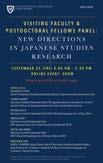
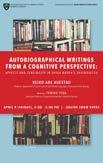
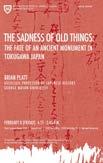
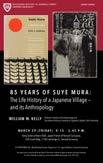
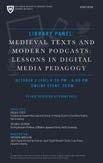
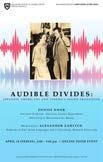
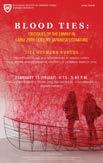
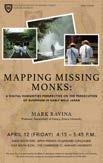
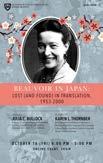
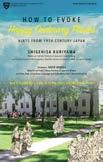
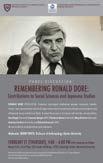
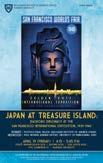
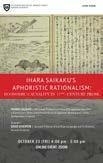
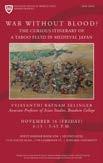
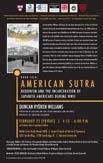
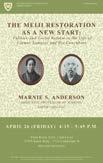
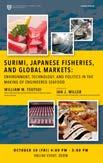
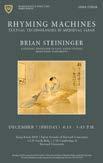
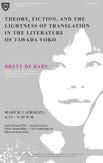
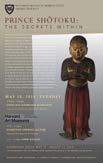
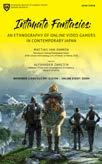

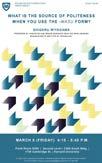
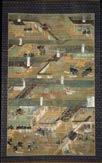
16
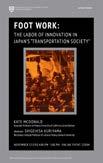
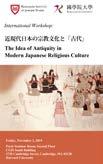
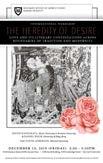
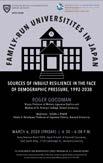
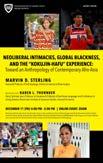
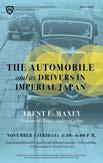


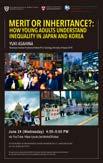
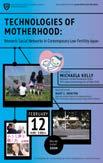
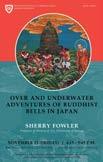
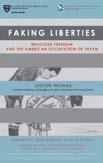


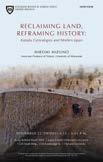
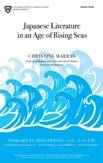

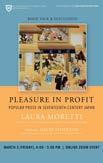
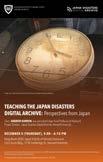
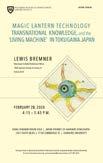

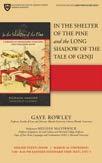
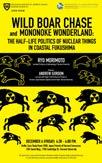
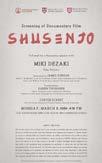

17 INTERNATIONAL CONFERENCE OCEANIC JAPAN: ENVIRONMENTAL HISTORIES OF THE ARCHIPELAGO AND THE SEA JANUARY 24 – 25, 2020 | HARVARD UNIVERSITY KANG SEMINAR ROOM S050 JAPAN FRIENDS OF HARVARD CONCOURSE CGIS SOUTH BUILDING | 1730 CAMBRIDGE STREET HARVARD ASIA CENTER HARVARD-YENCHING INSTITUTE EDWIN O. REISCHAUER INSTITUTE OF JAPANESE STUDIES AT HARVARD UNIVERSITY
Other Seminars
Each year the Institute organizes and/or sponsors a variety of seminars and lectures on topics related to Japan. A number of these events are co-sponsored with other departments and centers, as indicated below. All events in 2020-21 were held remotely over Zoom.
2020-21
Glen S. Fukushima, Center for American Progress
The 2020 U.S. Presidential Election: Politics, Economics, and Strategy
Faculty Host: Christina Davis
(USJP Seminar Series co-sponsored by RIJS)
Keiko Honda, Columbia University
Japan and ESG (Environmental, Social, and Governance Criteria): The Road Ahead
Faculty Host: Christina Davis
(USJP Seminar Series co-sponsored by RIJS)
Peter K. Bol, Harvard University
Grace Fong, McGill University
Andrew Gordon, Harvard University
Helen Hardacre, Harvard University
Long Live the Digital Scholarship Project!
(HYL East Asian Digital Scholarship Series co-sponsored by FC, KI, and RIJS)
John Haley, Washington University of St. Louis
Learning from Japan’s Criminal Justice Success
Discussant: J. Mark Ramseyer
(USJP Seminar Series co-sponsored by RIJS)
Mary Alice Haddad, Wesleyan University
Kanoko Kamata, University of Pittsburgh
Civil Society and Policy Advocacy in Contemporary East Asia
Faculty Host: Susan Pharr
(USJP Seminar Series co-sponsored by RIJS)
Keizo Takemi, House of Councillors, National Diet of Japan
Margarita Estévez-Abe, Syracuse University
Aya Goto, Fukushima Medical University
Japan’s Response to Covid-19
Discussants: Sak Sakoda (Office of the Secretary of Defense), Lt. Gen. Burton Field (Ret., U.S. Air Force), Admiral Scott Swift (Ret., U.S. Navy)
Faculty Host: Michael Reich (USJP Seminar Series co-sponsored by RIJS)
Allison Alexy, University of Michigan
Family Law in a Family Nation: Custody, Conflicts, and Activism in Contemporary Japan
Moderator: Merry White, Boston University (USJP Seminar Series co-sponsored by RIJS)
Tobias Harris, Teneo Intelligence
The Iconoclast: Shinzō Abe and the New Japan
Discussant: Koji Sonoda, The Asahi Shimbun
Faculty Host: Christina Davis (USJP Seminar Series co-sponsored by RIJS)
Hsiang-An Wang, Academia Sinica Center for Digital Cultures
The Academia Sinica Digital Humanities Research Platform (HYL East Asian Digital Scholarship Series co-sponsored by FC, KI, and RIJS)
Amy Catalinac, New York University
How Pork-Barrel Politics Holds Japan’s Governing Coalition Together
Faculty Host: Christina Davis (USJP Seminar Series co-sponsored by RIJS)
Ohwada Toshiyuki, HYI Visiting Scholar, Keio University
Red Book and Video Games: Yellow Magic Orchestra and Afro-Asian Futurism
Faculty Host: Tomiko Yoda (HYI Visiting Scholar Talk Series co-sponsored by RIJS)
Michael Green, Georgetown University
Japan’s Strategy in Asia
Faculty Host: Christina Davis (USJP Seminar Series co-sponsored by RIJS)
Javier Cha, Seoul National University
The Big Data Turn in the Humanities: Sailing into Uncharted Waters (HYL East Asian Digital Scholarship Series co-sponsored by FC, KI, and RIJS)
Toshihiro Nakayama, Keio University
Shin-Wha Lee, Korea University
Wu Xinbo, Fudan University
East Asia Responds to U.S. Election Results
Discussant: Ezra Vogel
Faculty Host: Christina Davis (USJP Seminar Series co-sponsored by RIJS)
Xingyi Wang, PhD Candidate, Harvard University
Boundary of the Body: The Monastic Robe and Revival of the Vinaya in Medieval China and Japan (HBSF Lecture Series co-sponsored by RIJS)
Charles McClean, USJP Postdoctoral Fellow
Sangjun Park, Osaka University
New Dimensions of Japan’s Democratic Governance
Faculty Host: Christina Davis (USJP Seminar Series co-sponsored by RIJS)
Karen L. Thornber, Harvard University
Global Healing: Literature, Advocacy, Care
Co-chair: Sari Altschuler, Northeastern University
Co-chair: Amy Boesky, Boston College
Co-chair: David S. Jones, Harvard University (Mahindra Humanities Center Seminar Series co-sponsored by RIJS)
Naoko Shimazu, Yale-NUS College
Enacting “Asia” as Imagined Geographies: Tokyo 1943 and Bandung 1955
Faculty Host: Andrew Gordon (USJP Seminar Series co-sponsored by RIJS)
Paul Blustein, Centre for International Governance Innovation
Schism 2.0: China and America’s Trade Conflict in the Next U.S. Administration
Faculty Host: Christina Davis (USJP Seminar Series co-sponsored by RIJS)
18
Hirotaka Takeuchi, Harvard University
Smart Work-X: Japan’s Transformations in the New Normal Faculty Host: Christina Davis
(USJP Seminar Series co-sponsored by RIJS)
Glen S. Fukushima, Center for American Progress
Joseph S. Nye, Jr., Harvard University
Susan J. Pharr, Harvard University
Steven Vogel, University of California Berkeley
In Memoriam: Ezra Vogel in U.S.-Japan Relations: Enduring Legacies
Faculty Host: Christina Davis
(USJP Seminar Series co-sponsored by JSB, JSNY, Maureen and Mike Mansfield Foundation, and RIJS)
Connor Mills, USJP Postdoctoral Fellow
Yoshiaki Kubo, USJP Associate, University of the Ryukyus
Sadamasa Oue, USJP Associate, Japan Air Self-Defense Force
US Military Bases and Japan’s National Security Strategy
Discussant: Sherry L. Martin, U.S. Department of State
Faculty Host: Christina Davis
(USJP Seminar Series co-sponsored by RIJS)
Patrick “Pakkun” Harlan, Comedian, TV Personality, and Voice Actor
My Inexplicable Journey: from Colorado Paperboy to Comedian and Commentator in Japan
Faculty Host: Andrew Gordon (USJP Seminar Series co-sponsored by RIJS)
Yumi Kim, Johns Hopkins University
Madness in the Early Twentieth-Century Japanese Family: Writing Away from Psychiatry
Faculty Host: Victor Seow
(AC Science and Technology in Asia Seminar Series co-sponsored by RIJS)
Stephen W. Schneider, Harvard University
Angela Chang, Harvard University
Rachel Saunders, Harvard University
The Botany of a Buddhist Sculpture—Hinoki Cypress and Prince Shōtoku at Age Two (Harvard Art Museums Art Study Center Seminar co-sponsored by RIJS)
Diana Stanescu, USJP Postdoctoral Fellow
Ryoma Nikaido, USJP Associate, Weekly Toyo Keizai Magazine
Takashi Nakao, USJP Associate, Japan Ministry of Finance
Liberalization and Regulation in the Global Political Economy
Discussant: William Grimes, Boston University
Faculty Host: Christina Davis
(USJP Seminar Series co-sponsored by RIJS)
Curtis Milhaupt, Stanford University
J. Mark Ramseyer, Harvard University
The Carlos Ghosn Controversy and Japanese Corporate Governance
Faculty Host: Christina Davis
(USJP Seminar Series co-sponsored by RIJS)
Daniel Aldrich, Northeastern University
Hiroko Kumaki, Dartmouth College
Ryo Morimoto, Princeton University
Japan’s 2011 Disasters: Ten-Year Anniversary Reflections
(Special Series on Japan’s 2011 Disasters co-sponsored by USJP and RIJS)
Rana Mitter, University of Oxford
The Century of Self-Definition: How China has Thought About Itself and Defined Itself to the World from the Late Qing to the Present Day
(Lecture 1 of 3: How New is the New Era?)
Discussant: Odd Arne Westad, Yale Univesity
(Reischauer Lecture Series co-sponsored by AC, FC, KI, and RIJS)
Rana Mitter, University of Oxford
The Century of Self-Definition (Lecture 2 of 3: An Era of Emotion?)
Discussant: Jie Li
(Reischauer Lecture Series co-sponsored by AC, FC, KI, and RIJS)
Rana Mitter, University of Oxford
The Century of Self-Definition: (Lecture 3 of 3: A Sense of Purpose?)
Discussant: Anurabh Ghosh
(Reischauer Lecture Series co-sponsored by AC, FC, KI, and RIJS)
Motoshige Itoh, University of Tokyo
Japan’s Growth Strategy in the 2020s: Demand- and Supply-Side Dimensions
Faculty Host: Christina Davis
(USJP Seminar Series co-sponsored by HKS Mossavar-Rahmani Center)
David C. Atherton, Harvard University
Rachel Saunders, Harvard University
Sheryl L. White, Harvard University
David G. Haskell, The University of the South Haiku and You: Painting Edo and the Arnold Arboretum
(Arnold Arboretum and Harvard Art Museums Presentation)
Karen L. Thornber, Harvard University
Amy Borovoy, Princeton University
Andrew D. Gordon, Harvard University
Public Health and Wellness in the Covid-19 Era: Japan in Global Context
Faculty Host: Christina Davis
(USJP Seminar Series co-sponsored by RIJS)
Do-Hyun Han, Academy of Korean Studies
Thi Phuong Cham Nguyen, Vietnam Academy of
Social Sciences
Kunio Nishikawa, Ibaraki University
Sukumar Mini, University of Calicut
Tiejun Wen, Renmin University of China
Modernizing Asia’s Countryside
Faculty Host: Elizabeth Perry
(HYI Annual Roundtable co-sponsored by AC, FC, KI, SAI, and RIJS)
Matthias Kaun, Berlin State Library
An Introduction to CrossAsia
(HYL East Asian Digital Scholarship Series co-sponsored by Berlin State Library, FC, KI, and RIJS)
Shunji Izutsu, Japan Air Self-Defense Force
Saadia M. Pekkanen, University of Washington
Joseph S. Nye, Jr., Harvard University
U.S.-Japan Alliance Cooperation in Air and Space
Faculty Host: Christina Davis
(USJP Seminar Series co-sponsored by RIJS)
Matthew McKelway, Columbia University
Yukio Lippit, Harvard University
The Sound of One Hand Knocking: Kano Sansetsu’s Solitary Encounters
Moderator: Rachel Saunders
(Harvard Art Museums Presentation co-sponsored by RIJS)
19
Natsuko Sakata, USJP Associate, Japan Ministry of Foreign Affairs
Kotaro Ono, USJP Associate, Asahi Shimbun
Managing the U.S.-Japan Alliance in the 2000s
Discussant: Thomas Berger, Boston University
Faculty Host: Christina Davis
(USJP Seminar Series co-sponsored by RIJS)
Katherine Matsuura, Japan Digital Scholarship Librarian Make the Best Use of Databases
(East Asian Digital Scholarship Community Hour co-sponsored by FC and RIJS)
Takashi Nagata, Kyushu University
Japan, the Pandemic, and the Olympics
Moderators: Jerold S. Kayden and James Robson
(AC Asia Beyond the Headlines Seminar Series co-sponsored by RIJS)
Yurika Wakamatsu, Occidental College
Vibrant Decay: Drifting among Moonlit Lotuses with Okuhara Seiko
Respondent: Victoria Weston, University of Massachusetts Boston
Moderators: Melissa McCormick and Rachel Saunders
(Harvard Art Museums Presentation co-sponsored by RIJS)
Elizabeth Emery, Montclair State University
Reframing Japonisme: Painting Edo and Beyond
Respondent: Chelsea Foxwell, University of Chicago
Moderator: Rachel Saunders
(Harvard Art Museums Presentation co-sponsored by RIJS)
Brent Hou-Ieong Ho, Berlin State Library CrossAsia Integrated Textrepository Workshop (HYL East Asian Digital Scholarship Series co-sponsored by FC, KI, and RIJS)
2021-22
T.J. Pempel, University of California Berkeley
A Region of Regimes: Prosperity and Plunder in the Asia-Pacific
Discussant: Meg Rithmire, Harvard University
Faculty Host: Christina Davis
(USJP Special Series on Japanese Economic Statecraft co-sponsored by AC, WCFIA, and RIJS)
Ulrike Schaede, University of California San Diego
The Digital Transformation and Japan’s Business Reinvention
Faculty Host: Christina Davis
(USJP Special Series on Japan-U.S. Cooperation in Digital Governance cosponsored by HKS Mossavar-Rahmani Center and RIJS)
Sarah Bauerle-Danzman, Indiana University
Bloomington
Sophie M. Aitsahalia, Princeton University
Kristin Vekasi, USJP Associate, University of Maine Investment Screening and Supply Chain Security: Japanese, EU, and U.S. Perspectives on China
Faculty Host: Christina Davis (USJP Seminar Series co-sponsored by CES, FC, HKS Mossavar-Rahmani Center, and RIJS)
Mihoko Matsubara, Nippon Telegraph and Telephone Corporation
Japan’s Changing Cybersecurity and the Future of U.S.-Japan Relations
Faculty Host: Christina Davis
(USJP Special Series on Japan-U.S. Cooperation in Digital Governance cosponsored by RIJS)
Kenji Shibuya, University of Tokyo
Rethinking Japan’s Response to the Covid-19 Pandemic
Faculty Host: Christina Davis
(USJP Special Series on Japanese Economic Statecraft co-sponsored by HSPH Takemi Program and RIJS)
Celeste Arrington, George Washington University
From Manners to Rules: The Legalistic Turn in Governance and Secondhand Smoke Prevention in Japan and South Korea
Faculty Host: Christina Davis
(USJP Special Series on Policy Innovations in Crises co-sponsored by Japan Foundation CGP, EALS, KI, and RIJS)
Aaron Proffitt, University of Albany (SUNY)
Buddha’s Name as Mantra in Medieval Japan (HBSF Lecture Series co-sponsored by Mahindra Humanities Center and RIJS)
Izumi Nakamitsu, United Nations
UN’s Role in the Global Disarmament Agenda
Faculty Host: Christina Davis
(USJP Special Series on Policy Innovations in Crises, co-sponsored by Japan Foundation CGP, HKS Belfer Center, and RIJS)
Eunmi Mun, University of Illinois Urbana-Champaign
Lifetime Advantage at the Top? The Norm of Lifetime Employment and CEO Succession in Japan
Faculty Host: Mary Brinton (USJP Special Series on Policy Innovations in Crises, co-sponsored by Japan Foundation CGP, Dept. of Sociology, HKS Mossavar-Rahmani Center, and RIJS)
Naofumi Nakamura, HYI Visiting Scholar, University of Tokyo
Diversification and Convergence: The Development of Railway Technology in Meiji Japan
Faculty Host: Victor Seow (HYI Visiting Scholar Talk Series co-sponsored by RIJS)
Ko Maeda, University of North Texas
Daniel M. Smith, Columbia Univeresity
Sheila A. Smith, Council on Foreign Relations
Japan’s Post-Election Policy Agenda
Faculty Host: Christina Davis (USJP Special Series on Policy Innovations in Crises, co-sponsored by Japan Foundation CGP, and RIJS)
Mesrob Vartavarian, AC Fellow
Back to the Water’s Edge? Historicizing Current American Security Policies in the Asia-Pacific
Discussants: Vincenzo Bollettino, Carter Eckert, Aki Nakai (USJP Policy Innovations Fellow)
Faculty Host: James Robson (AC Seminar co-sponsored by KI, USJP, and RIJS)
Melissa McCormick, Harvard University
Bloodlines: Fictional Character Genealogies and Medieval Matrilines (Mahindra Humanities Center Seminar co-sponsored by RIJS)
M. William Steele, International Christian University
Japan in an Era of Uncertainty: Jabs by Editorial Cartoons, 2020-2021
Faculty Host: Andrew Gordon (USJP Seminar co-sponsored by Dept. of History and RIJS)
22
20
James L. Schoff, Carnegie Endowment for International Peace
High-Tech Alliance: Pursuing Economic Security through Closer U.S.-Japan Science and Technology Collaboration
Faculty Host: Christina Davis
(USJP Special Series on Japan-U.S. Cooperation in Digital Governance co-sponsored by RIJS)
Toyomi Asano, HYI Visiting Scholar, Waseda University
Between the Collapse of Japanese Empire and Normalization with South Korea: Reconsidering Reparations, Memories, and Regional Studies Centering upon Edwin Reischauer
Faculty Host: Andrew Gordon (HYI Visiting Scholar talk co-sponsored by RIJS)
Angela Chin, Pomona College
Joseph Coleman, Indiana University
Jason Danely, Oxford Brookes University
Atsushi Miyawaki, University of Tokyo
Abe Global 2022: Polishing Japan’s Silver: Aging Sustainably in the 21st Century
Faculty Host: Mary Brinton
(Social Science Research Council panel co-sponsored by Oxford Brookes
Healthy Ageing and Care Network, Harvard Center for Population and Development Studies, and RIJS)
Yves Tiberghien, University of British Columbia
Why Has the East Asian Covid Model Diverged over Delta and Omicron?
Faculty Host: Christina Davis (USJP Seminar Series co-sponsored by RIJS)
Andrew Gordon, Harvard University
Modern Memories: The Public History of Industrial Heritage in Japan
Faculty Commentator: Jaewoong Jeon, Harvard University
Student Commentator: Yiyun Peng, Cornell University
Naoko Ishii, University of Tokyo
The Global Commons Stewardship: Enacting Systemic Transformations
Faculty Host: Christina Davis
(USJP Special Series on Policy Innovations in Crises, co-sponsored by Japan Foundation CGP and RIJS)
Yusaku Horiuchi, Dartmouth College
Evacuation from Afghanistan: The Case of Japan
Faculty Host: Christina Davis
(USJP Seminar Series co-sponsored by RIJS)
Tokuhiro Ikeda, USJP Associate, Japan Maritime Self-Defense Force
Aki Nakai, USJP Policy Innovations Fellow
Keita Azuma, USJP Associate, Japan Cabinet Secretariat
Security Threats and Alliance Cooperation in the Indo-Pacific Region
Discussant: Jennifer Lind, Dartmouth College
Faculty Host: Christina Davis
(USJP Special Series on Japan-U.S. Cooperation in Digital Governance co-sponsored by RIJS)
Kaoru Iokibe, USJP Associate, University of Tokyo
Katherine Starr, USJP Associate, NHK World Japan
Koichi Ai, USJP Associate, Embassy of Japan in the United States
Rethinking the Origins of U.S.-Japan Alliance
Discussant: Thomas Berger, Boston University
Faculty Host: Christina Davis
(USJP Special Series on Policy Innovations in Crises, co-sponsored by Japan Foundation CGP and RIJS)
Chinami Iokibe, USJP Associate, Japan Ministry of Health, Labor, and Welfare
Shinichi Kijima, USJP Associate, Japan Ministry of Economy, Trade, and Industry
Nobuhiro Mitsuoka, USJP Associate, Nippon Telegraph and Telephone
Keisuke Sakanoue, USJP Associate, Japan National Police Agency
Leveraging Digital and Technological Transformations: Lessons from America?
Faculty Host: Christina Davis
(USJP Special Series on Japan-U.S. Cooperation in Digital Governance co-sponsored by RIJS)
Kazuyuki Motohashi, University of Tokyo
Japan’s High-Tech Competitiveness in an Era of U.S.-China Decoupling
Faculty Host: Christina Davis
(USJP Special Series on Japan-U.S. Cooperation in Digital Governance co-sponsored by RIJS)
Wendy Cutler, Asia Society Policy Institute
Lizhi Liu, Georgetown University
Stephen Weymouth, Georgetown University
Digital Globalization and Governance: East Asia and Beyond
Faculty Host: Christina Davis
(USJP Special Series on Japan-U.S. Cooperation in Digital Governance co-sponsored by RIJS)
Victor Seow, Harvard University
Carbon Technocracy: Energy Regimes in Modern East Asia
Discussant: Megan A. Black, MIT
Discussant: Conevery B. Valencius, Boston College
Discussant: Gabriela S. Laveaga, Harvard University
Faculty Host: Shigehisa Kuriyama
(Department of the History of Science Book Panel co-sponsored by RIJS)
Sayaka Chatani, National University of Singapore
Zainichi Koreans in the Politics of Decolonization and Deimperialization
Faculty Host: Andrew Gordon (USJP Seminar co-sponsored by RIJS)
Julia Cross, Yale University
Relic Transfers and Statue-Reliquaries in Medieval Japan
(HBSF Lecture Series co-sponsored by RIJS)
Shuhei Kurizaki, USJP Associate, Waseda University
Kristin Vekasi, USJP Associate, University of Maine
The Political Economy of Global Ownership and Supply Chains
Faculty Host: Christina Davis (USJP Seminar Series co-sponsored by RIJS)
Akihiko Uchiyama, USJP Associate, Chiba University
Tomoka Miyachi, USJP Associate, Takushoku University
Yuki Yamanaka, USJP Associate, Japan Ministry of Economy, Trade, and Industry
New Economic Agendas in Advanced Capitalism
Discussant: Henry Laurence, Bowdoin College
Faculty Host: Christina Davis
(USJP Seminar Series co-sponsored by RIJS)
Adam P. Liff, Indiana University
The U.S.-Japan Alliance and Taiwan
Faculty Host: Mary Brinton
(USJP Special Series on Policy Innovations in Crises, co-sponsored by Japan
Foundation CGP and RIJS)
23
21
Megumi Naoi
Domestic Institutions, Geographic Concentration, and Agricultural Liberalization: Evidence from Remote-Sensed Cropland Data and Elite Interviews
Faculty Host: Christina Davis
(USJP Special Series on Policy Innovations in Crises, co-sponsored by Japan Foundation CGP and RIJS)
Masataka Harada, USJP Associate, Fukuoka University
Jordan Hamzawi, USJP Postdoctoral Fellow
Yosuke Takashima, USJP Associate, Asahi Shimbun
Social Bases of Democratic Governance
Discussant: Mary Alice Haddad, Wesleyan University
Faculty Host: Christina Davis
(USJP Special Series on Policy Innovations in Crises, co-sponsored by Japan Foundation CGP and RIJS)
Gabrielle Cheung, USJP Postdoctoral Fellow
Masahiko Furuya, USJP Associate, Japan Ministry of Finance
Hirokazu Watanabe, USJP Associate, Japan Ministry of Finance and Cabinet Secretariat
Threats to Economic Independence
Discussant: William Grimes, Boston University
Faculty Host: Christina Davis
(USJP Special Series on Policy Innovations in Crises, co-sponsored by Japan Foundation CGP and RIJS)
24
22
Conferences, Symposia, Workshops & Events
Exhibition
14 FEBRUARY 2020 – 6 JUNE 2021
Painting Edo: Japanese Art from the Feinberg Collection
Curators: Rachel Saunders, Yukio Lippit
Painting Edo — the largest exhibition ever presented at the Harvard Art Museums — offered a window onto the supremely rich visual culture of Japan’s early modern era. Selected from the unparalleled collection of Robert S. and Betsy G. Feinberg, the more than 120 works in the exhibition connect visitors with a seminal moment in the history of Japan, as the country settled into an era of peace under the warrior government of the shoguns and opened its doors to greater engagement with the outside world.
Following the closure of H/AM due to Covid-19, this exhibition went on virtual display through Google Arts & Culture and a series of recorded art talks on Vimeo.
(H/AM exhibition co-sponsored by HAA and RIJS)
Workshop
20 NOVEMBER 2020
East Asian Digital Scholarship Community Hour
Organizers: Kwok-Leung Tang, Katherine Matsuura
The East Asian Digital Scholarship Community Hour was an experimental and casual community-building event aiming to provide a platform for scholars and, in particular, graduate students, to share their ideas, skills, big and small projects, and learn from each other. Presentation topics included cases of datasets, databases, tools, and software with East Asian foci; digital tools and workflows; ongoing digital projects open to suggestions and comments; and projects in need of collaboration with others.
(Co-sponsored by FC, JDRC, and RIJS)
Workshop
13 JANUARY 2021
East Asian Digital Scholarship Community Hour
Organizers: Kwok-Leung Tang, Katherine Matsuura
The theme of the second East Asian Digital Scholarship Community Hour was “Off the Beaten Track: Cool Tools for Online Teaching.” Adapting to the continuously changing needs of remote learning, this event introduced several online classroom platforms including mmhmm, Gather, and Congregate. The recorded session can be found on YouTube.
Shigehisa Kuriyama (Harvard University)
Alexander Zahlten (Harvard University)
Juhee Kang (Harvard University)
Tami Blumenfield (USC, Yunnan University, and University of New Mexico)
Kaitlyn Ugoretz (UC Santa Barbara)
(Co-sponsored by FC, JDRC, and RIJS)
Film Screening
5-12 FEBRUARY 2021
Edo Avant-Garde
Edo Avant-Garde (2019) reveals the story of how Japanese artists of the explosively creative Edo period (1615–1868) pioneered innovative approaches to painting that many in the west associate most readily with so-called modern art of the 20th century. Through groundbreaking interviews with scholars, priests, art dealers, and collectors in Japan and the United States, the film explores how the concepts of abstraction, minimalism, and surrealism are all to be found in Edo painting.
Culminating in a post-screening lecture, this film was made available to registered participants during the same week to stream for free through the Harvard Art Museums.
(Special Event co-sponsored by Harvard University, Tsai Lecture Fund, AC, FC, HYI, KI, SAI, USJP, and RIJS)
Post-Screening Lecture
9 FEBRUARY 2021
Edo Avant-Garde Conversation with Curator Rachel Saunders and Filmmaker Linda Hoaglund
Edo Avant-Garde (2019) reveals the story of how Japanese artists of the explosively creative Edo period (1615–1868) pioneered innovative approaches to painting that many in the west associate most readily with so-called modern art of the 20th century. Through groundbreaking interviews with scholars, priests, art dealers, and collectors in Japan and the United States, the film explores how the concepts of abstraction, minimalism, and surrealism are all to be found in Edo painting.
Rachel Saunders, Abby Aldrich Rockefeller Curator of Asian Art, Harvard Art Museums
Linda Hoaglund, Filmmaker, Director of Edo Avant-Garde
(Special Event co-sponsored by Harvard University, Tsai Lecture Fund, AC, FC, HYI, KI, SAI, USJP, and RIJS)
Symposium
22 FEBRUARY 2021
Japanese Economic Statecraft in an Era of U.S.-China Rivalry
This symposium brought together five scholars from the U.S. and Japan for presentations and discussions regarding Japanese economic statecraft in the context of U.S., Japan, and China relations.
Introduction and Opening Remarks
Christina Davis, Harvard University
Takashi Shiraishi, Prefectural University of Kumamoto
Recent Developments in Japan Economic Statecraft
Saori Katada, University of Southern California
Japan’s Geoeconomic Strategy for Quality Infrastructure
Daniel Drezner, Tufts University
Recent Developments in U.S. Economic Statecraft
Q&A and Closing Remarks
(AC Special Series on Japanese Economic Statecraft co-sponsored by USJP and RIJS)
25 23
Gallery Talk
6 MARCH 2021
Virtual Student Guide Tour: The Bind of Beauty, with Sophia Mautz
In this virtual tour, Sophia Mautz ’21 examined the tension between nature and artifice in constructions of feminine beauty, leading an interactive discussion of Under the Cherry Blossoms, an early 16th-century illustration for The Tale of Genji by Tosa Mitsunobu, and two sculptures by women: Daphne (1930) by Renée Sintenis and Nature Study (1986) by Louise Bourgeois.
(H/AM event co-sponsored by RIJS)
Workshop
8 APRIL, 17 APRIL, and 4 MAY 2021
Haiku and You: Writing Workshop
Held in conjunction with the H/AM exhibition Painting Edo, a series of workshops invited participants to learn about the Japanese tradition of haiku poetry, visit the Arnold Arboretum, and share their own prompts, plants, poetry, and paintings on social media. Submitted works were published in an online gallery.
(H/AM event co-sponsored by Arnold Arboretum and RIJS)
Workshop
13 JANUARY 2021
East Asian Digital Scholarship Community Hour
Organizers: Kwok-Leung Tang, Katherine Matsuura
The third East Asian Digital Scholarship Community Hour focused on the topic of summer research. As field research in East Asia remained impossible in most cases, participants discussed methods for conducting research efficiently and utilizing databases to procure materials.
(Co-sponsored by FC, JDRC, and RIJS)
Gallery Talk
4 MAY 2021
Art Talk Live: Reframing Japonisme
In this talk, curator Rachel Saunders took a close look at a major new acquisition that shined a distinctly different light on European interest in “Japanese art,” and the ways in which this new category was constructed in Japan itself. This talk was part of a series inspired by ReFrame, a museum-wide initiative to reimagine the function, role, and future of the university art museum.
(H/AM event co-sponsored by RIJS)
Symposium
25 MAY 2021
Symposium in Honor of Professor Susan J. Pharr, Edwin O. Reischauer Professor of Japanese Politics, Harvard University
This symposium was held online to honor Professor Susan J. Pharr and celebrate her retirement after thirty-four years of service to Harvard University, including thirty-two years as Director of the Program on U.S.-Japan Relations, Weatherhead Center of International Affairs, and six years as Director of the Edwin O. Reischauer Institute of Japanese Studies.
Welcome Remarks
Christina Davis, Harvard University
Jeffry Frieden, Harvard University
Mary Brinton, Harvard University
Recent Developments in Japan Economic Statecraft
Margarita Estévez-Abe, Syracuse University
Rieko Kage, University of Tokyo
Jiyeoun Song, Seoul National University
Michael Witt, INSEAD
Chair: Hirotaka Takeuchi, Harvard University
Japan’s Democratic Governance: Institutions and Civil Society
Daniel Aldrich, Northeastern University
Amy Catalinac, New York University
Henry Laurence, Bowdoin College
Chair: Elizabeth Perry, Harvard University
Japan in International Relations
Phillip Lipscy, University of Toronto
Saadia Pekkanen, University of Washington
Kim Reimann, Georgia State University
Mireya Solís, Brookings Institution
Chair: Christina Davis, Harvard University
Closing Remarks
Susan Pharr, Harvard University
(Co-sponsored by Dept. of Government, USJP, and RIJS)
2021-22
Due to the gradual recovery of on-campus activities in the midst of Covid-19, there were no conferences, symposia, or workshops to report for the 2021-22 academic year.
24
Publications
The Harvard East Asian Monograph Series
Along with other Asia centers, RIJS plays an active role in publishing outstanding research in the prestigious Harvard East Asian Monograph series (HEAM). Books on Japan sponsored and funded by RIJS are produced through the Publications Office of the Harvard University Asia Center. The series plays a vital role in making the research of scholars available to a broader audience, and many leading academics in Japanese studies today, including numerous Harvard Ph.D. recipients, began their academic careers with books that appeared in the series. Of the approximately 410 books that have been issued to date, over 150 deal with Japan. The works concern all aspects of Japan with particular emphases on Japan’s history, culture and society, and literature. In 2020-22, the following books on Japan were published in the HEAM series, listed in chronological order:
2020-21
Robert Goree Popular Geography and Meisho Zue in Late Tokugawa Japan
Maren A. Ehlers Give and Take: Poverty and the Status Order in Early Modern Japan
Michael Wert Meiji Restoration Losers: Memory and Tokugawa Supporters in Modern Japan
Susan Blakeley Klein Dancing the Dharma: Religious and Political Allegory in Japanese Noh Theater
Adam J. Lyons Karma and Punishment: Prison Chaplaincy in Japan
W. Puck Brecher Honored and Dishonored Guests: Westerners in Wartime Japan
2021-22
Sachiko Kawai Uncertain Powers: Sen’yōmon-in and Landownership by Royal Women in Early Medieval Japan Creative Industries
Susan Westhafer Furukawa The Afterlife of Toyotomi Hideyoshi: Historical Fiction and Popular Culture in Japan
Brian Hurley Confluence and Conflict: Reading Transwar Japanese Literature and Thought
Marnie S. Anderson In Close Association: Local Activist Networks in the Making of Japanese Modernity, 1868-1920
Simon Avenell Asia and Postwar Japan: Deimperialization, Civic Activism, and National Identity
25
Program on U.S.-Japan Relations
Founded in 1980 based on the belief that the United States and Japan have become so interdependent that the problems they face require cooperation, the Program on U.S.-Japan Relations (USJP) strives to foster research on Japan’s relationship with the U.S. and the rest of the world, as well as the domestic issues that bear on the country’s international roles and evolving regional context to which it belongs.
Housed at 61 Kirkland Street, USJP is administered by the Weatherhead Center for International Affairs (WCFIA), cosponsored by RIJS, and overseen by a Harvard Faculty Advisory Committee. Since January 2020, Christina L. Davis has served as Program Director.
The Program’s intellectual mandate includes a wide range of issues and problems in U.S.-Japan relations; contemporary Japanese culture, economy, politics, and society as viewed from a comparative perspective; common problems of advanced industrial democracies; international relations of Asia and Asian regionalism; the globalization of Japanese popular culture; the rise of civil society in Asia; and global governance of issues such as energy, environment, and public health.
The Program and its activities reach a wide audience of faculty and students in the social sciences and throughout Harvard’s professional schools. As the seminar series of USJP and RIJS have surprisingly little overlap – two-thirds of attendees join one, but not the other – this partnership creates new synergies and connections.
Each year with support from RIJS, USJP hosts 2-3 postdoctoral fellows whose research focuses on U.S.-Japan relations and 12-15 scholars and outstanding professionals in government, business, finance, journalism, NGOs, and many other fields. While in residence, they conduct research, speak in classes, participate in Japanese language tables hosted by Harvard’s undergraduate houses, and serve as resources for faculty and students, both graduate and undergraduate. In 2021, USJP developed a new Visiting Policy Innovations Fellowship with support from the Japan Foundation Center for Global Partnership (CGP).
The USJP postdoctoral fellows for 2020-22 are listed below, along with their Ph.D. institutions, fields, degree years, and research topics. Due to the Covid-19 pandemic, the 2020-21 cohort was conducted remotely, while the 2021-22 cohort spent their fellowship year hybrid.
2020-21
Charles McClean
University of California San Diego, Political Science, 2020
Silver Democracy: Youth Representation in an Aging Japan
Connor Mills
Princeton University, History, 2020
Base Towns: Everyday Life In and Around the Garrisons of Postwar Japan, 1945–1954
Diana Stanescu
Princeton University, Political Science, 2020
Do Bureaucracy-Industry Ties Shape Trade Agreements?
Evidence from Japan
2021-22
Gabrielle Cheung
University of Southern California, Political Science and International Relations, 2021
Resilience in the Liberal International Order: Japan’s Role in Promoting Global Economic Cooperation
Jordan Hamzawi
University of California Davis, Political Science, 2021
One Party to Rule Them All? The Return of Party Competition Failure in Japan
Aki Nakai (Policy Innovations Fellow)
Boston University, Political Science, 2016
Why and How Is Japan Responding to the Emerging Technologies, Especially Artificial Intelligence?
26
The Program also coordinates closely with RIJS to provide summer internship opportunities for Harvard College students and maintains a well-organized and active alumni group in Tokyo. Please view USJP’s SoundCloud and Vimeo channels for further introduction.
The USJP staff for 2020-22 was as follows:
Executive Director Shinju Fujihira
Program Coordinator Amy Stockton
Staff Assistant Emma Duncan
Research Assistant Sophie Welsh
Japanese Politics Online Seminar Series (JPOSS)
Starting in the 2020-21 academic year, the Japanese Politics Online Seminar Series (JPOSS) was launched as an inter-university initiative by Amy Catalinac (NYU), Charles Crabtree (Dartmouth), Christina Davis (Harvard), Shinju Fujihira (Harvard), Yusaku Horiuchi (Dartmouth), Phillip Lipscy (University of Toronto), and Dan Smith (Columbia). The goals of JPOSS have been to: (1) promote discussion of works-in-progress, especially for early career stage scholars; (2) invite political scientists who do not specialize on Japan to serve as discussants and engage them with theories and evidence discussed in the Japanese political context; and (3) promote networking among scholars at different career stages, as well as those based in different countries and world regions. Since its inception, over 100 scholars have participated as paper presenters and discussants.
In June 2022, the organizers published an article, “Workshops without Borders: Building an Online Community of Japan Scholars,” Political Science and Politics, Vol. 55, Issue 3 (2022), to illustrate the opportunities and challenges of building a global online community of political scientists with shared interests. JPOSS has also sponsored three sessions for professionalization of political science scholars dedicated to the study of Japan.
Prior to 2020, USJP and RIJS co-sponsored the Contemporary Japanese Politics Study Group, which was suspended in response to Covid-19; the study group’s activities were subsequently moved to JPOSS.
Harvard’s Libraries
Harvard has one of the world’s leading research collections on Japan, and RIJS plays a major role in providing the necessary support for its maintenance and development.
Harvard-Yenching Library
In 1978-79, RIJS established a special fund to support Japanese language acquisitions by the HarvardYenching Library (HYL). Since then, this fund contributes yearly income to HYL and is used to acquire Japanese-language books and materials incremental to Harvard’s library budgetary allotments. Kuniko Yamada McVey serves as Librarian for the Japanese Collection.
Library Travel Grants
Through the Harvard-Yenching Library Travel Grant Program, scholars from other institutions throughout the U.S. and Canada have been able to visit Harvard and consult the Japanese collections at the Fung Library and HYL, which are supported by the Institute.
27
Digital Initiatives at Harvard
Evolving with the times, RIJS has embarked on several initiatives in collaboration with its faculty and in partnership with the university and other institutions and organizations in the U.S. and Japan, with the objective of bringing digital scholarship to the field of Japanese Studies.
Japan Digital Research Center (JDRC)
The Japan Digital Research Center was established in 2017 for the purpose of developing new modes of support and collaboration amongst librarians, faculty, and students working in an increasingly digitized and networked environment. The JDRC is focused on meeting the opportunities and challenges that international and multilingual digital scholarship presents, and the emphasis is on identifying, building, and sharing innovative and evolving digital resources that advance scholarship for Japan both today and into the future. Formerly known as the Documentation Center of Contemporary Japan (DCJ), the JDRC has been one of three libraries housed in the Fung Library. Although originally focused on the collection of Japanese social science journals, newspapers, and ephemera of postwar Japan, over time the rapid expansion of digital resources became increasingly central to the mission and purpose of the DCJ. In keeping with these changes, RIJS redefined the mission of the DCJ and introduced the JDRC.
Led by Katherine Matsuura (Japan Digital Scholarship Librarian) and Sachie Shishido (Japan Digital Project Manager), the JDRC serves as the home of the Constitutional Revision in Japan Research Project and the Japan Disasters Digital Archive and works closely with faculty, technology support, and other partners to maintain and develop these resources for research, teaching, and outreach to the larger worldwide community.
Constitutional Revision in Japan Research Project (CRJP)
Founded by Helen Hardacre in 2005, the Constitutional Revision in Japan Research Project (CRJP) meets to discuss, analyze, and document the process and debate surrounding the revision of Japan’s 1947 postwar constitution. In addition, the project seeks to situate the contemporary process of constitutional revision in the longer historical context of constitutionalism in Japan, as well as examine the role and perspectives of the political parties, the media, the political, labor, and business associations, women’s groups, religious groups, and many civil society groups in the constitutional revision debate. Related topics include Japan’s defense and security; imperial succession; rights and duties of citizens; the status of women; and the relationship between religion and state. Research on constitutional revision connects RIJS and other branches of Asian and international studies, including the social sciences, humanities, and beyond. The project engages not only students and faculty at Harvard and the New England region, but also faculty, diplomats, researchers, and students from Japan and around the world.
Leadership of the project was formalized through the creation of an Advisory Council, which currently includes Alexis Dudden (History, University of Connecticut), Timothy George (History, University of Rhode Island), Helen Hardacre (EALC, Harvard University), Keigo Komamura (Law, Keio University), and Franziska Seraphim (History, Boston College). This group convenes to set directions and plan future activities for the project.
A central aim of the project is to collect and preserve original data and documents generated in the course of debate. With assistance from the Library Digital Initiative (LDI) in early 2006, the project began monthly “web-harvesting,” archiving material from a target set of 77 related Japanese websites. By 2007, the project launched its website, which features links to these Japanese websites both current and archived, a chronology of events relevant to the current debate, and a bibliography with over 1000 references to academic
28
research and political analysis of the Meiji Constitution, postwar constitution, and ongoing discussion of constitutional revision.
Beginning in 2020, CRJP worked with the Japan Digital Research Center (JDRC) to develop a new website with the objective of offering new ways for scholars to engage with materials both in English and Japanese. While preserving the websites archived as part the project’s original initiative, this new website would serve as a database of constitution chapters, related drafts, and the wide variety of views shared online by politicians, political parties, movements, groups and organizations, scholars, and research institutions. As the website was officially launched in Spring 2023, details will be shared in the next biennial report.
In June 2021, Helen Hardacre, Keigo Komamura, Timothy George, and Franziska Seraphim published Japanese Constitutional Revisionism and Civic Activism (Lexington Books). This co-edited volume examines the history of Japan’s constitutional debates, key legal decisions and interpretations, the history and variety of activism, and activists’ ties to party politics and to fellow activists overseas.
Japan Disasters Digital Archive (JDA)
Launched in July of 2012, the Japan Disasters Digital Archive (JDA) is an advanced search engine for materials from around the globe, building digital repositories about the Great East Japan Earthquake in 2011. With the support of metaLAB and the Center for Geographic Analysis at Harvard, the project seeks to collect, preserve, and make broadly accessible many forms of first-hand information and primary documentation of the events of 11 March 2011 and their aftermath. Through the archive, the project aims to provide a public space of information exchange, to establish innovative means of organization, access, and integration of materials, and to contribute to teaching, research, and policy analysis both now and in the future. But most of all, JDA hopes that the archive will serve as a site of shared memories and reflection for those most affected by these events and concerned about their consequences.
JDA actively encourages user submissions of resources such as websites, videos, and photographs, as well as user testimonials about personal experiences of the disasters and their aftermath. Its innovative map feature provides a visualization of all materials that are tagged with geographic information in real time. And through the sharing and exchanging of collections and presentations, JDA fosters new connections, both between items and among users. This network of users is ever-expanding, from a major organization that submits thousands of location- and direction-tagged photographs, to fellow citizens who share their family’s experiences, to historians who seek to understand the interaction of public and private actors in the relief effort. Thus, the archive is an interactive space that promotes and, indeed, thrives on user participation. A video introduction can be found here: https://www.jdarchive.org/en/about/about-archive.
For a complete list of team members, please visit the JDA website.
29
Supporting Harvard’s Educational Mission
No goal of the Reischauer Institute of Japanese Studies (RIJS) is more important than advancing the educational mission of the University. The Institute pursues this task in a number of ways: providing opportunities for undergraduates to study, conduct research, and hold internships abroad; funding grants to support the research and training of graduate students; and enriching the Harvard curriculum by promoting the development of courses on Japan.
Programs for Harvard Undergraduates
International Experience
Harvard is engaged in a concerted effort to give every undergraduate a significant international experience during his or her time in the College. Long a leader in this area, RIJS has increased its offerings over the past decade to allow more undergraduates to study, conduct research, hold internships, and pursue other related activities in Japan. Due to the Covid-19 pandemic, several of these opportunities were cancelled or postponed, while other opportunities were adapted to a remote format. From fall 2020 through summer 2022, RIJS funded or facilitated 24 opportunities for Harvard College students and provided support for a wide range of Japan-related student activities. These programs are made available to students through various funding sources at the University.
In 2017, in partnership with the Harvard School of Engineering and Applied Sciences (SEAS) and sciencerelated departments within FAS, RIJS developed the Japan Summer Science Undergraduate Research Program (JSSURP), a new grant opportunity in response to the increasing interest in research experience abroad in the life, physical/natural, engineering, and applied sciences. This opportunity provides support for non-credit, independent laboratory research at host institutions in Japan.
In cooperation with other Harvard international and regional centers, such as the Office of Career Services (OCS), the Office of International Education (OIE), and Harvard Summer School (HSS), RIJS offers informational events for undergraduate students designed to introduce grants, internships, and study abroad programs. These include the OCS Freshman Open House, OIE Open House, Study Abroad Programs & Perspectives Student Panel, International Education Week/Photo Contest, HSS Study Abroad Fair, and OCS Summer Funding & Programs Fair.
Each fall, RIJS organizes its own meetings for students to introduce programs and opportunities in Japan, and each spring holds a pre-departure meeting required for all summer and fall travelers, as well as orientations for participants of certain programs. Adjusting to developments in the Covid-19 situation, in 2020-21, RIJS offered weekly undergraduate virtual office hours for students to learn about Japan-related opportunities, as well as an information session for undergraduate summer opportunities, including support for language study and internships. In 2021-22, RIJS offered a series of either on-campus or remote information sessions for undergraduates, as well as a pre-departure orientation for those able to travel to Japan in summer 2022.
30
Academic Year Study in Japan
A number of well-established programs in Japan accept applications from Harvard students. All of them offer Japanese language instruction and courses in English. They include, in Tokyo: International Christian University, Keio University, Sophia University, University of Tokyo, and Waseda University; and in the Kansai region: Kobe University, Kyoto University, and Nanzan University.
In addition, some American colleges and universities run year-abroad programs in Japan that admit students from other institutions. RIJS and the Japanese Language Program (JLP) at Harvard assist students in identifying programs suitable to their interests and language preparation.
Kyoto Consortium for Japanese Studies
Harvard College students with two years of language study may spend an academic year or semester at the Kyoto Consortium for Japanese Studies (KCJS). KCJS, formerly the Kyoto Center for Japanese Studies, offers courses in the Japanese language, humanities, and social sciences. Initially based at Kyoto University from its inception in September 1989, the program moved to its current home at Doshisha University in 2009.
The Consortium is currently headquartered at Columbia University and is sponsored by the following universities: Boston University, Brown University, University of Chicago, Columbia University /Barnard College, Cornell University, Emory University, Harvard University, University of Pennsylvania, Princeton University, Stanford University, Washington University in St. Louis, and Yale University, in association with University of Virginia. RIJS contributed start-up funds and, along with other sponsoring institutions, has made annual financial contributions to the Consortium since it was established. In 2020-22, the Harvard faculty representative was RIJS Executive Director Gavin H. Whitelaw.
The Inter-University Center for Japanese Language Studies in Yokohama
The Inter-University Center for Japanese Language Studies (IUC) is administered by Stanford University and the Freeman Spogli Institute for International Studies and is sponsored by a consortium of now sixteen universities (previously fourteen), including Harvard. RIJS contributes annually toward its support.
Summer Grants and Programs
RIJS was among the first of Harvard’s international and regional centers to offer summer funding for undergraduate research abroad, beginning in 1980. In addition to travel grants for senior thesis research, RIJS now awards grants in support of Japanese language study and internships, as well as supplementary grants for Harvard College students attending the Harvard Summer School Kyoto or pursuing other science research opportunities in Japan.
See end of section for a detailed list of grant recipients and program participants.
31
Henry Rosovsky Travel Grant
Since 1980, RIJS has awarded the Henry Rosovsky Summer Research Travel Grant to students conducting research and/or fieldwork in Japan directly related to a senior honors thesis in an area of Japanese Studies, primarily humanities or social sciences. This prestigious award is made with funds from an endowment established by an anonymous donor to commemorate the retirement of Henry Rosovsky, a distinguished economic historian of Japan, from the post of FAS Dean. Funds from this endowment are divided between the Center for Middle Eastern Studies and RIJS.
In 2013, RIJS expanded the range of support covered by this grant to include supplementary funding for students attending Harvard Summer School in Japan.
Harvard Summer Language Study Grant
Created in 2007, the Harvard Summer Language Study Grant is intended to provide students with the opportunity to study Japanese language in its home country and explore Japanese culture. This grant was initially available for students with two years of Japanese or equivalent and subsequently available for those with one year of study at Harvard. In addition to KCJS and IUC, mentioned above, students receive funding to study at accredited programs such as Princeton in Ishikawa (PII) and Hokkaido International Foundation (HIF).
During the Covid-19 pandemic, no students traveled to Japan for language study; in summer 2021, RIJS supported 4 students taking online courses through Harvard Summer School. In summer 2022, RIJS supported 7 students studying Japanese language either domestically or remotely.
Harvard Summer Internship Program in Japan
For over twenty-five years, Japanese Studies at Harvard has provided opportunities for undergraduates to hold internships in Japan, following the university-wide mission to give every College student a significant international experience. Through this program, eligible students are selected for placement in organizations in Japan, where they learn about local society and culture while gaining professional experience in the workplace. Each year, such opportunities for students continue to diversify with the growing ties of RIJS. The main objectives of the Japan summer internship program are as follows:
• Increase the total number of internship opportunities in Japan and the funding necessary to support them;
• Extend opportunities to students from various backgrounds and experience levels;
• Monitor and coordinate the numerous efforts of the College that offer research, study, and internship opportunities in Japan;
• Organize orientations to provide students with the necessary preparation to derive maximum benefit from their stay;
• Provide a Summer Student Program Coordinator in Tokyo to serve as a resource over the summer.
Established in 1988 by Tazuko Monane, then director of the Japanese Language Program (JLP), the internship program continued to grow with the vital support of JLP, under the guidance of Wesley Jacobsen, program director since 1993. Initially, the program was open only to undergraduates with two years of Japanese, but in 2005, RIJS began a major initiative to extend its internship opportunities to a wider circle of students, creating additional internships for students with little or no Japanese language. And in 2017, RIJS extended eligibility to first-year students in the Regional Studies East Asia (RSEA) Master’s Program.
In cooperation with JLP, USJP, OCS, Rotary Club of Okayama, Harvard Club of Japan, Harvard Business School Japan Research Center, several Harvard science departments, and other programs on campus, RIJS has significantly increased the number of internships, coordinating closely to maintain relationships with existing
32
host organizations and identify new ones. Since its inception, Harvard has sent more than 500 undergraduates to intern in locations such as Tokyo, Kyoto, Osaka, Hiroshima, Hokkaido, Ibaraki, Iwate, Miyagi, Okayama, and Okinawa.
During the Covid-19 pandemic, no students traveled to Japan for internships; in summer 2021, RIJS supported 3 students participating in remote internships. In summer 2022, RIJS sent 8 students on internships in Japan. For both years, internships included both students placed directly into organizations by RIJS and those who self-arranged internships through different channels, including, but not limited to, faculty, departments, and alumni networks. Working alongside Harvard’s student service and resources offices, RIJS also supports students by providing small supplementary grants and by including them in orientation activities.
Harvard Summer School in Japan
In 2007, under the leadership of RIJS, Harvard Summer School developed a credit-based, 8-week summer program in Japan. The HSS program is currently directed by James Robson, James C. Kralik and Yunli Lou Professor of East Asian Languages and Civilizations. Initially hosted by Waseda University in Tokyo, the program moved to Doshisha University in 2010. Students typically enroll in two courses, which are also open to Doshisha students. Non-credit Japanese language instruction with Doshisha staff is also provided for students with no previous Japanese language training.
In summers 2021 and 2022, the HSS Japan Program was cancelled due to Covid-19.
Japan Summer Science Undergraduate Research Program
Launched in 2018 in response to the increasing interest in research experience abroad in the sciences, the Japan Summer Science Undergraduate Research Program (JSSURP) provides support for non-credit, independent laboratory research at host institutions in Japan. This opportunity is designed to prepare Harvard College students in life, physical/natural, engineering, and applied sciences for post-baccalaureate research positions, graduate/doctoral study, and postgraduate fellowships. Successful applicants receive a grant package put together by RIJS and the host institution, which primarily supports travel and accommodation.
This new program also includes non-credit internships at various RIKEN centers, established through the efforts of Takao Hensch, and the Japan-U.S. Undergraduate Research Exchange Program (JUREP), a physics research opportunity founded and directed by John Doyle. Participants of either program are eligible to apply for funding through RIJS.
In summers 2021 and 2022, JSSURP was cancelled due to Covid-19.
Enrichment at Harvard
Noma-Reischuaer Undergraduate Prize in
Japanese Studies
Each year, RIJS conducts a competition to award the Noma-Reischauer Prize of $1000 to the best Harvard College student essay on a Japan-related topic. The Prize was established and supported from 1996 through 2010 by Kodansha Publishers in honor of Sawako Noma, then President of Kodansha, and Professor Edwin O. Reischauer. Since 2011, the prize has been funded by RIJS and awarded in conjunction with the Tazuko Monane Prize for Language Study, given by the Japanese Language Program. In 2020-21, the Prize winner was João Paulo Krug Paiva ’21 (Theater, Dance, and Media), for “A Choreographic Contribution to the Elimination of Nuclear Weapons: the Narrative Interrupted in Is It a Bad Time to Talk.” In 2021-22, the Prize winner was Chihiro Ishikawa ’21 (Sociology/EAS), for “The Global Diffusion of the #MeToo Movement: SNS Usage and Anonymity in Japanese and Korean Feminist Activism.”
33
Reischauer Institute of Japanese Studies Prize, OIE International Photo Contest
In fall 2006, RIJS collaborated with OIE to inaugurate the sponsorship of a Japan category within Harvard College’s annual International Photo Contest. The contest was cancelled from 2020-22 due to travel restrictions related to Covid-19.
Worldwide Week, Destination: World / Powered by Pechakucha
As part of Harvard’s Worldwide Week, which showcases the breadth of Harvard’s global engagement across schools through a series of internationally-themed academic and cultural events, RIJS and the CGIS centers organized and hosted Destination: World / Powered by Pechakucha, starting in 2018. In this event, Harvard College students shared their stories of personal discovery and intellectual exploration made possible through experiences abroad. Pechakucha, which originated in Tokyo, follows a format of 20 images x 20 seconds, in which the images advance automatically while the presenter is talking.
In fall 2020, Koji Everard ’21 (History) presented on his thesis research as a Henry Rosovsky Undergraduate Summer Research Travel Grant recipient. His presentation was titled, “Tracing the Footsteps of the Sugar Beet in Hokkaido.”
Though Worldwide Week returned to campus in 2021, there was no Pechakucha event due to limted travel opportunities for students over the past year.
Bāba, Babushka Student Photo Exhibition
With the generous help of the Davis Center for Russian and Eurasian Studies, RIJS hosted a student photo exhibition titled Bāba, Babushka in the Asian Centers Lounge in the CGIS South Building in February 2020. In response to the closure of the CGIS buildings due to Covid-19, the Bāba, Babushka exhibition was moved online into a 3D gallery featured on the RIJS website.
This exhibition featured photographs taken by Dasha Bough (’21) and Sky Russell (’20). Dasha spent the summer of 2019 in Volgograd, Russia to film a documentary following the life of a babushka named Galiya, and Sky spent the same summer in Tenryu-mura, a rapidly aging rural hamlet in central Japan, photographing the day-to-days of the bābas (grandmas) and jījis (grandpas) she met there.
The in-person exhibition in CGIS remained on display through campus re-opening until May 2022.

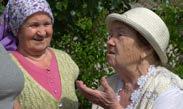
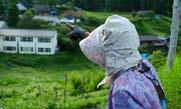

34
Japanese Language Table
Since fall 2008, RIJS has hosted a monthly Japanese language table at CGIS. Now co-hosted with USJP, the language table provides a space for an enthusiastic group of undergraduate and graduate students, postdoctoral fellows, faculty, RIJS visiting scholars, and USJP research associates to converse in Japanese and discuss a wide range of topics over lunch. From 2020-22, Japanese Language Table gatherings were postponed until further notice.
Support for Undergraduate Activities
Harvard Aikido Club
RIJS provides support to the Harvard Aikido Club (Aikikai), which brings together Harvard students to practice aikido and to study the principles and techniques behind the sport. Harvard’s oldest martial arts club, the group holds practices, classes, and seminars at the Malkin Athletic Center and the Quadrangle Recreation and Athletic Center. The Aikikai was on hiatus in 2020-21 and resumed their activities in 2021-22.
Harvard-Radcliffe Chado Society
A student group dedicated to learning chanoyu (“Japanese tea ceremony”), this organization strives to learn the traditional ways to prepare, serve, and drink tea. While officially an undergraduate organization, the chado society also welcomes graduate students, non-student Harvard affiliates, and non-Harvard students. Participants study the Way of Tea in the tradition of the Urasenke School, and the instructors are all members of Urasenke Boston, the local affiliate of the Kyoto-based Urasenke organization. The head of the international organization is Sen Soshitsu XVI, a direct descendant of one of the first Japanese tea masters, Sen no Rikyu. The Chado Society was on hiatus in 2020-22.
Harvard-Radcliffe Kendo Club
Founded in 1990 by four undergraduates, the Harvard-Radcliffe Kendo Club is one of the oldest collegiate kendo clubs in North America. Open to both undergraduate and graduate student members, the club maintains close ties with the Keio University Kendo Club, whose leader, Fumio Ueda, 7th dan kyoshi, is also the head coach of the Harvard team. Former RIJS Visiting Scholar Junji Himeno, 7th dan, coached this team during his time at Harvard, and in 1997 former Prime Minister Ryutaro Hashimoto, a leading kendo player, practiced with the club on a visit. Wesley Jacobsen serves as Harvard faculty advisor. During the Covid-19 remote period throughout 2020-22 the Kendo Club held weekly online practices and seminars with instructors from Japan over Zoom. In 2022, RIJS provided support to the Harvard Intercollegiate Ryuko Taikai, which was held on 20 March 2022, in place of their annual Harvard Invitational Shoryuhai Intercollegiate Kendo Tournament.
35
Undergraduate Japan Experience 2020-22
2020-21
Summer Language Study Grant
Abiba Imam Dyuti ’24, Undeclared Intermediate Japanese S-120 (HSS Online Course)
Ryan Kong ’24, Undeclared Basic Japanese S-C (HSS Online Course)
Ana Mariella Mundaca ’22, Economics Intermediate Japanese S-120 (HSS Online Course)
Ton-Nu Nguyen-Dinh ’22, History
Intermediate Japanese S-120 (HSS Online Course)
Summer Intership Program in Japan
Kaede Ishidate ’23, Government Japan-America Student Conference (Remote)
Jacob Smith ’22, Social Studies Blackship Ventures/Jenerate Partners (Remote)
Satoshi Yanaizu ’23, Social Studies
The Asia Group (Remote)
2020 Noma-Reischauer Undergraduate Prize in Japanese Studies
João Paulo Krug Paiva ’21, Theater Dance & Media
A Choreographic Contribution to the Elimination of Nuclear Weapons: the Narrative Interrupted in Is It a Bad Time to Talk
2021-22
Henry Rosovsky Summer Research Travel Grant
Hannah Lamport ’23, Chemistry & HAA
“Preserving a Legacy: Use of Traditional Colorant and Kimono Production in Modern Japanese Textiles”
Maya Simkowitz ’22, Social Studies
“Remembering the Trauma of Our Ancestors”
Summer Language Study Grant
Simon Arango-Baquero ’23, Neuroscience Inter-University Center for Japanese Language (Remote)
Larissa Barth ’25, Undeclared
Intermediate Japanese S-120 (HSS Online Course)
Sasha Hitachi-Kizziah ’25, Undeclared Intermediate Japanese S-120 (HSS Online Course)
Anthony Miguel ’25, Undeclared Middlebury Summer Immersion Program
Bozhen Peng ’25, Undeclared Middlebury Summer Immersion Program
Moses Stewart ’25, Undeclared Intermediate Japanese S-120 (HSS Online Course)
William Troutman ’25, Undeclared Intermediate Japanese S-120 (HSS Online Course)
Summer Intership Program in Japan
Lauren Baehr ’24, History & Literature Asia Pacific Initiative
Anna Blanchfield ’24, Chemical & Physical Biology University of Tokyo
Alex Karbowski ’25, Undeclared HBS Japan Research Center
Kaoru Fujiwara ’24, Economics Jenerate Partners and Blackship Ventures
Jonas Hansen ’24, Engineering Sciences University of Tokyo
Kaede Ishidate ’23, EAS & Government Japan-America Student Research Conference
Tomoki Matsuno ’25, Undeclared Ministry of Foreign Affairs and the Office of Yasutoshi Nishimura
Saya Mitchell ’25, Undeclared
P&E Directions
2021 Noma-Reischauer Undergraduate Prize in Japanese Studies
Chihiro Ishikawa ’21, Sociology & EAS (current RSEA)
The Global Diffusion of the #MeToo Movement: SNS Usage and Anonymity in Japanese and Korean Feminist Activism
36
Support for Graduate Student Training
Research and Training Support
RIJS supports GSAS and the future development of Japanese Studies by providing a range of fellowships and grants to Harvard graduate students. Due to Covid-19, funding and travel were severely limited in 2020-21. However, during these two years, RIJS was able to support 78 opportunities in total, both remote and in-person.
Dissertation Completion/Supplementary Dissertation Research Grants
RIJS awards Dissertation Completion Grants to support advanced graduate students in the full-time write-up of their dissertations and Supplementary Dissertation Research Grants to provide graduate students with the opportunity to continue year-long research in Japan and to support continued research after initial support by external funding sources. In the case of non-U.S. citizens, thus ineligible for many of the major fellowships that support fieldwork in Japan, these grants provide the core funding for their fieldwork.
For 2020-21, RIJS awarded Dissertation Completion, Dissertation Writing, or Supplementary Dissertation Research Grants to 4 doctoral students. For 2021-22, RIJS awarded grants to 4 doctoral students. Grant recipients represented a cross-section of academic departments: EALC, EALC/HEAL, History of Art and Architecture, Religion, and Sociology.
Summer Research Travel Grants for Graduate Students
RIJS awards Summer Research Travel Grants to allow graduate students to deepen their knowledge of Japan, maintain and improve their Japanese language skills, and develop ideas, investigate sources, and build contacts in Japan for future dissertation research. In the case of comparative projects that include Japan, graduate students also may apply for funding to conduct research in another country.
For 2020-21, RIJS funded 1 graduate student to travel to Japan and awarded grants to 3 graduates students for remote summer research. For 2021-22, RIJS funded 5 graduate students for summer research in Japan. Wintersession Research Travel Grants were not awarded in 2020-22 due to Covid-19 and travel restrictions.
Summer Language Study Grants for Graduate Students
RIJS provides Summer Language Study Grants to graduate students (both PhD and AM) seeking summer language study in programs in Japan and elsewhere. Especially in the social sciences, some students develop their interest in Japan only after entering graduate school and need additional time to build their language skills to research-level competence. Normally the language is Japanese, though applications for other languages are encouraged from students whose research would be furthered by another language or students who are engaged in comparative research that involves Japan.
Due to Covid-19, no students traveled to Japan for language study. In 2020-21, RIJS gave 8 Summer Language Study Grants to graduate students and supported 2 GSAS Tuition Waivers for Harvard Summer School courses online. In 2021-22, RIJS supported 4 graduate students for language study either online or within the U.S.
37
Covid-19 Bridging Grants and Emergency Funding
In response to travel restrictions and other obstacles caused by Covid-19, RIJS also provided bridging grants and emergency funding to graduate students to utilize resources domestically or remotely from 2020-22. A total of 18 students received bridging grants for Summer 2021, and a total of 19 students received emergency funding during the 2021-22 academic year, 7 in Fall 2021 and 12 in Spring 2022.
The Inter-University Center for Japanese Language Studies in Yokohama
Graduate students with at least two years of Japanese language training who want to devote an academic year to full-time advanced Japanese language study may apply to the Inter-University Center for Japanese Language Studies Program (IUC), located in Yokohama. On behalf of Harvard, RIJS supports the IUC by providing a yearly membership fee of $10,000.
Noma-Reischauer Graduate Student Essay Prize
Each year, RIJS conducts a competition to award the Noma-Reischauer Essay Prize of $1500 for the best Harvard graduate student essay on a Japan-related topic. The Prize was established and supported from 1996 through 2010 by Kodansha Publishers in honor of Sawako Noma, then President of Kodansha, and Professor Edwin O. Reischauer. Since 2011, the prize has been funded by RIJS and awarded in conjunction with the Tazuko Monane Prize for Language Study, given by the Japanese Language Program.
In 2020-21, the Prize winner was Jesse LeFebvre, EALC, for his essay “The Politicization of Image: The ‘Elite Populism’ of The Illustrated Narrative Scroll of Major Counselor Ban and its Implications for Medieval Large-Format Illustrated Scrolls.” In 2021-22, the Prize winner was Yingxue Wang, HAA, for her essay “Why Beetle Wings? An Ecological Approach to the Tamamushi Shrine.”
See end of section for a detailed list of grant recipients and program participants.
Professional and Write-up Support
Professional Development
RIJS seeks to contribute to the professional development of graduate students in a variety of ways. Beginning in 2005 with the construction of the CGIS buildings, RIJS made space available for doctoral students engaged in dissertation write-up (see Advancing Research). RIJS provides funds for graduate students to meet and discuss their research in progress, and graduate students are also encouraged to interact with RIJS visiting scholars, either informally or through the Student Host Program (see Advancing Research).
In addition, RIJS provides small grants to graduate students for paper presentations at conferences or professional meetings, for the purposes of professional development and dissemination of dissertation research. Students in relevant fields may also apply for small grants that cover travel costs for job interviews held at professional meetings. RIJS awarded 8 conference attendance grants in 2020-21, and 2 in 2021-22, all attended online.
Support for Dissertation Writers Groups
RIJS recognizes that dissertation writing can be a lonely pursuit and that many students benefit from support and comments from their peers. In 2020-22, the Institute continued to make funding available to groups of graduate students in Japanese Studies looking to meet on a regular basis to discuss their dissertations.
38
Support for Student Groups
Harvard Buddhist Studies Forum
The Harvard Buddhist Studies Forum (HBSF) is a long-standing lecture series that invites scholars to present on a topic related to the field of Buddhist Studies, while promoting a wide range of disciplines, geographical areas, and methodologies. As Buddhist Studies is a highly interdisciplinary and cross-regional field, RIJS joins with other programs at Harvard in supporting scholarly activities in this area of research. In 2020-22, the Institute contributed support to the following lectures, which were hosted virtually over Zoom.
23 November 2020
Xingyi Wang, PhD Candidate, Harvard University
Boundary of the Body: The Monastic Robe and Revival of the Vinaya in Medieval China and Japan (co-sponsored by RIJS)
1 October 2021
Adam Lyons, Université de Montréal Prison Chaplains and the Ambiguous Public Good in Contemporary Japan (RIJS Japan Forum co-sponsored by HBSF and USJP)
15 October 2021
Shayne Dahl, RIJS Postdoctoral Fellow
Ancient Spirit, Modern Body: The Rise of Global Shugendō (RIJS Japan Forum co-sponsored by HBSF)
25 October 2021
Aaron Proffitt, University of Albany (SUNY)
Buddha’s Name as Mantra in Medieval Japan (co-sponsored by Mahindra Humanities Center and RIJS)
3 December 2021
Michaela Mross, Stanford University
Realizing Buddhahood through Singing: Music and Kōshiki in Sōtō Zen (RIJS Japan Forum co-sponsored by HBSF)
4 April 2022
Julia Cross, Yale University Relic Transfers and Statue-Reliquaries in Medieval Japan (co-sponsored by RIJS)
Harvard East Asia Society
The Harvard East Asia Society is organized by students in the RSEA program and is open to all those with an interest in East Asian cultures, history, and society. Students organize individual talks and an annual spring conference designed to provide an interdisciplinary forum for graduate students from the U.S. and elsewhere to exchange ideas and discuss current research on East Asia with peers, professors, and professionals. In 2021 and 2022, the conference was co-sponsored by the Asia Center, Fairbank Center, Korea Institute, Weatherhead Center, and RIJS.
The 24th annual HEAS graduate student conference was held virtually 27-28 February 2021 on the theme, “Moving Bodies: Mobility and Control Across East Asia.” Karen Thornber and Shigehisa Kuriyama led keynote dialogues. The 25th annual conference was held virtually 19-20 February 2022 on the theme, “The New Normal: Changes and Exceptions in East Asia.” James Robson led the keynote discussion.
39
Graduate Research and Training 2020-22
2020-21
Travel to Japan
Mari Kishi, EALC
The Culture of Excess: Space and Body in 90s Japan
Dissertation Completion Grants
Jonas Rüegg, EALC/HEAL
The Kuroshio Frontier: Business, State and Environment in the Making of Japan’s Pacific
Supplementary Dissertation Research Grants
Holly Hummer, Sociology
Childlessness in the United States and Japan
Yuxin Qin, Religion
Practitioners in Action: The Power of Lay Buddhists in Contemporary Japan
Summer Research Grants
Yedong Chen, EALC
Summer Research on the History of Japanese Computer Art Group: Computer Technique Group (CTG)
Jialu Li, Government
Taking the Cues: How Japanese Firms Shape Foreign Economic Policies
Janet Louie, EALC
Sounding the Transpacific: A Study of Cold War Film and Media in Hong Kong, Japan, and the USA
Summer Language Study Grants
Carolyn Bell, EALC, KCJS Classical Program
Gangsim Eom, Anthropology, IUC
Gene Kim, EALC, IUC
Ziyi Sarah Lin, RSEA, IUC
Trevor Menders, HAA, KCJS Classical Program
Xueyang April Peng, RSEA, KCJS
Maria Salvador Cabrerizo, HAA, IUC Kanbun Course
Jacob Williams, RSEA, IUC
GSAS Tuition Waivers for HSS Courses (Online)
Xiaofei Sophie Lei, RSEA, Japanese S-BAB
Yingxue Wang, HAA, Korean S-BAB
Conference Attendance Grants (Online)
Daniel Borengasser, EALC
Annual AAS Conference
Jeonghun Choi, RSEA
Society for the History of Authorship, Reading and Publishing Meeting
Charlotte Ciavarella, EALC/HEAL
Annual AAS Conference
Mari Kishi, EALC Annual AAS Conference
Joshua Linkous, EALC/HEAL Annual AAS Conference
Trevor Menders, HAA Annual AAS Conference
Yuxin Qin, Religion
Annual AAS Conference
Haruka Umetsu Cho, EALC/HEAL World Conference on Women’s Studies
Jacob Williams, RSEA Annual AAS Conference
Bridging Grants for Summer 2021
Fangdai Chen, Comp Lit
Patrick Chimenti, EALC
John Hayashi, History
Holly Hummer, Sociology
Leah Justin-Jinich, EALC
Juhee Kang, EALC/HEAL
Sara Kang, History
Yusung Kim, EALC
Sara Klingenstein, Religion
Reed Knappe, History
Lingling Ma, EALC
Yuxin Qin, Religion
Jonas Rüegg, EALC/HEAL
Jesus Solis, History
Helen Swift, HAA
Jonathan Thumas, EALC
Botagoz Ussen, Comp Lit
Bohao Wu, History
2021 Noma-Reischauer Graduate Prize in Japanese Studies
Jesse LeFebvre, EALC
The Politicization of Image: The “Elite Populism” of The Illustrated Narrative Scroll of Major Counselor Ban and its Implications for Medieval Large-Format Illustrated Scrolls
42 40
Graduate Research and Training 2020-22
2021-22
Dissertation Completion Grants (via GSAS)
John Hayashi, History
Hydraulic Taiwan: Colonial Conservation under Japanese Imperial and Chinese Republican Rule
Yusung Kim, EALC
Cold War Techno-Fantasy and Its Displays: New Materiality and Environment in South Korea and Japan
Jesse LeFebvre, EALC
The Antifragile Kannon Revitalizing Disaster and the Profileration the Hasedera Kannon
Lingling Ma, EALC
Creative Life Aesthetic Evolution and Japanese Modernism
Susan Taylor, Anthropology
The City of Texts: Affective Work and the Ethics of Care in Booktown Jimbocho, Tokyo
Dissertation Writing Grants
Jesse LeFebvre, EALC, Fall 2021
Helen Swift, HAA, Fall 2021
Summer Research Grants
Carolyn Bell, EALC
Japanese Buddhist Vestments and the Semiotics of Patchwork
Mari Kishi, EALC
Contemporary Japanese Female Sexuality and Media
Mei Mingxue Nan, Comparative Literature
Tsushima Yuko’s and Kuo John Sheng’s Japanese/American Passages to Taiwan
Patrick Sanguineti, RSEA
Transnational Tenrikyo Within Japanese America
Jonathan Thumas, EALC
A Translation and Study of the Daihizanji Engi
Summer Language Study Grants
Carolyn Bell, EALC, IUC Professional Tutorial (Online)
Yu Shan Mark Chen, EALC/HEAL, Middlebury Language Schools, German Immersion Program
Kassandra Diaz, EALC, IUC (Online) and University of Cambridge (UK)
Early Modern Japanese Palaeography Program
Trevor Menders, HAA, IUC Summer Professional Tutorial (Online)
Conference Attendance Grants (Online)
Yusung Kim, EALC
Annual Association for Asian Studies Conference
Yuxin Qin, Religion
International Conference of the European Association for Japanese Studies
Emergency Funding for Fall 2021
Leah Justin-Jinich, EALC
Sara Kang, History
Reed Knappe, History
Lingling Ma, EALC
Maria Salvador-Cabrerizo, HAA
Jesus Solis, History
Catherine Tsai, EALC/HEAL
Emergency Funding for Spring 2022
John Hayashi, History
Holly Hummer, Sociology
Juhee Kang, EALC/HEAL
Sara Kang, History
Sara Klingenstein, Religion
Reed Knappe, History
Lingling Ma, EALC
Yuxin Qin, Religion
Maria Salvador-Cabrerizo, HAA
Jesus Solis, History
Jonathan Thumas, EALC
Bota Ussen, Comparative Literature
2021 Noma-Reischauer Graduate Prize in Japanese Studies
Yingxue Wang, HAA
Why Beetle Wings? An Ecological Approach to the Tamamushi Shrine
43 41
Curriculum and Teaching
Curriculum Enrichment Grants
In the educational experience of Harvard College students, General Education (Gen Ed) courses, formerly Core courses, play a crucial and central role. As such, RIJS mounted a major initiative to increase the number of these courses dealing with Japan. The Institute also supported non-Japan specialists to add material on Japan to Harvard College courses they already offered or were developing. Cumulatively these courses have played an important role in bringing Japan more fully into the undergraduate educational experience.
Harvard College Core/Gen Ed Courses Developed under the Curriculum Enrichment Grant Program
Ryūichi Abé, EALC
Core: Foreign Cultures, Buddhism and Japanese Culture
Gen Ed: Aesthetic and Interpretive Understanding, Buddhism and Japanese Culture
Mary C. Brinton, Sociology
Gen Ed: Societies of the World, Inequality and Society in 21st-Century East Asia
Christina L. Davis, Sociology
Gen Ed: Societies of the World, Inequality and Society in 21st-Century East Asia
Andrew D. Gordon, History
Core: Historical Study, Tradition and Transformation in East Asian Civilization: Japan
Gen Ed: Societies of the World, Japan in Asia and the World
Shigehisa Kuriyama, EALC
Gen Ed: Culture and Belief, Medicine and the Body in East Asia and Europe
Ian J. Miller, History
Core: Historical Study, Japan’s Modern Revolution
Gen Ed: Societies of the World, Japan’s Modern Revolution (2010-11) / Japan’s Samurai Revolution (2011-12 and beyond)
Support for Departmental Teaching
RIJS encourages faculty and departments to invite outstanding scholars or other specialists of Japan to Harvard in order to enhance the educational experience in their particular field. Typically, visitors appear in classes and meet with faculty and students. RIJS also supports course excursions, travel, and other related activities. The Institute provides funding to these visits and activities, as well as funding for Harvard faculty to travel to Japan for purposes that will ultimately contribute to the educational experience of students.
The interest in Japan is broad among Harvard faculty and students and among the general public, extending to numerous art forms associated with Japanese culture, including film, kabuki, Noh drama, martial arts, tea ceremony, ikebana, and many others. RIJS plays an active role in sponsoring activities in which these cultural forms are linked to the educational mission of the University.
44 42
Courses on Japan at Harvard 2020-22
Faculty of Arts and Sciences
General Education (Gen Ed)
GENED 1017
Americans as Occupiers and Nation-Builders
Andrew Gordon and Erez Manela
GENED 1042
Anime as Global Popular Culture
Tomiko Yoda
GENED 1049
East Asian Cinema
Jie Li
GENED 1083
Permanent Impermanence: Why Buddhists Build Monuments
Jinah Kim and Yukio Lippit
GENED 1119
Law, Politics, and Trade Policy: Lessons from East Asia
Christina Davis
GENED 1145
Global Japanese Cinema
Alexander Zahlten
Freshman Seminars
FRSEMR 52G
Nuclear Dilemmas
Benjamin Wilson
FRSEMR 61K
Life Lessons from Professional Killers: What We Can Learn from the Samurai
David Atherton
FRSEMR 62Z
Buddhist Enlightenment: Visions, Words, and Practice
Ryūichi Abé
FRSEMR 70L
Ancient East Asia: Contested Archaeologies of China, Korea, and Japan
Rowan Flad
FRSEMR 70Y
Asian America
Diana Eck
FRSEMR 71D
Zen and the Art of Living: Making the Ordinary Extraordinary
James Robson
East Asian Languages and Civilizations
East Asian Studies
EASTD 97AB
Introduction to the Study of East Asia: Issues and Methods
Melissa McCormick
EASTD 98K
Economic Governance in East Asia
Daniel Koss
EASTD 115
Japanese Monsters
William Tsutsui
EASTD 140
Major Religious Texts of East Asia
Ryūichi Abé
EASTD 141
East Asian Religions: Traditions and Transformations
James Robson
EASTD 142
Wisdom
Shigehisa Kuriyama and Thomas Kelly
EASTD 143AB
Introduction to Digital Tools and Methods in East Asian Humanities
Kwok-Leong Tang
EASTD 153
Buddhism, Japanese Arts and Culture
Ryūichi Abé
EASTD 161
Animated Spirituality: Japanese Religion in Anime, Manga, and Film
Helen Hardacre
EASTD 194
Historical Legacies in East Asian Politics
Daniel Koss
EASTD 198
Political Parties of East Asia
Daniel Koss
EASTD 220R
Medieval Japanese Picture Scrolls
Melissa McCormick
EASTD 260
The Lotus Sutra: Texts, Narratives, and Translations
Ryūichi Abé
EASTD 261
Advanced Readings in East Asian Art
Melissa McCormick
East Asian Film & Media Studies
EAFM 201
Media Mix: Representations and Meaning Between Media in Japan
Alexander Zahlten
Japanese Language Courses
JAPAN BAB (2 courses each year)
Elementary Japanese
Yuko Kageyama-Hunt
JAPAN 106A
Classical Japanese
David Atherton
43
Courses on Japan at Harvard 2020-22
JAPAN 120AB (2 courses each year)
Intermediate Japanese I
Naomi Asakura 2020-21 / Miki Miyagawa 2021-22
JAPAN 130AB (2 courses each year)
Intermediate Japanese II
Tomoko Graham
JAPAN 140AB (2 courses each year)
Advanced Modern Japanese
Yoshimi Nagaya (2020-21) / Naomi Asakura (2021-22)
JAPAN 150AB (2 courses each year)
Readings and Discussion in Japanese Social Sciences
Yoshimi Nagaya (2020-21) / Naomi Asakura (2021-22)
JAPAN 210AB (2 courses each year)
Reading Scholarly Japanese for Students of Chinese and Korean
Wesley Jacobsen
Japanese History
JAPANHIST 120 (Cross-listed with HDS)
Japanese Religions in the 20th and 21st Centuries
Helen Hardacre
JAPANHIST 126
Shinto
Helen Hardacre
JAPANHIST 151A
Introduction to Edo and Meiji Period Hentaigana
Shigehisa Kuriyama
JAPANHIST 214R (Cross-listed with HDS)
Major Issues in the Study of Japanese Religions: Precarious Japan
Helen Hardacre
JAPANHIST 260R
Topics in Japanese Cultural History – Toward a History of the Here and Now
Shigehisa Kuriyama
JAPANHIST 270
Early Modern Japanese History
David Howell
Japanese Literature
JAPANLIT 124
The Tale of Genji in Word and Image
Melissa McCormick
JAPANLIT 170
Traditional Japanese Literature: From Mythology to (Early) Modernity
David Atherton
JAPANLIT 260
Early Modern Japanese Literature and Culture
David Atherton
JAPANLIT 270
Topics in Modern and Contemporary Japanese Fiction
Tomiko Yoda
Government
GOV 94NA
Japanese Politics and Foreign Policy
Aki Nakai
History
HIST 12U
The Social Life of Science in East Asia
Ian Miller
HIST 14Y
Between East Asia and the Americas: Migration, Diaspora, Empire
John Hayashi
HIST 1023
Japan in Asia and the World
Andrew Gordon and David Howell
HIST 1026
The Rise and Fall of Postwar Japan
Andrew Gordon
HIST 1610
East Asian Environments: China, Japan, Korea
Ian Miller
HIST 1623
Modern Japan: Empires and Aftermaths
Andrew Gordon
HIST 1951
Japanese Imperialism and the East Asian Modern
Ian Miller
HIST 2651
Japanese History
Andrew Gordon
HIST 2653
Historiography of Modern Japan
Andrew Gordon
History of Art and Architecture
HAA 18K
Introduction to Japanese Art
Melissa McCormick (2020-21)/ Steffani Bennett (2021-22)
HAA 81
Art of Monsoon Asia: Interconnected Histories
Jinah Kim
HAA 98BR
East Asian Painting: China, Korea, Japan
Joseph Koerner
HAA 183N
Nihonga: Modern Japanese Painting
Yukio Lippit
HAA 281M
Sesshū Tōyō and Medieval Japanese Ink Painting
Steffani Bennett
44
Courses on Japan at Harvard 2020-22
HAA 285P
Topography of Vision: Asian Cases
Eugene Wang
HAA 288
Chinese Paintings in Japanese Collections
Yukio Lippit
History of Science
HISTSCI 229
The Nuclear Age: Critical Historical Perspectives
Benjamin Wilson
Linguistics
LING 174
Tense and Aspect in Japanese
Wesley Jacobsen
LING 176
History and Prehistory of the Japanese Language
Wesley Jacobsen
Social Studies
SOCSTD 98NQ
Global East Asia
Nicole Newendorp
Sociology
SOCIOL 3323
Social Demography Workshop
Mary Brinton and Jason Beckfield
Harvard Divinity School
HDS 3958 (Cross-listed with EALC)
Japanese Religions in the 20th and 21st Centuries
Helen Hardacre
HDS 3968 (Cross-listed with EALC)
Major Issues in the Study of Japanese Religions: Precarious Japan
Helen Hardacre
Harvard Graduate School of Design
HIS 4377
Competing Visions of Modernity in Japan
Seng Kuan
HIS 4454
The Project and the Territory: Japan Story
Mohsen Mostafavi
HIS 4483
Late-modern Japan and the Wild Samurai Generation
Seng Kuan
STU 1321 (Spring 2021)
Fudo/Umwelt: Devising Transformative Environments in Japan
Mohsen Mostafavi
STU 1321 (Spring 2022)
Tokyo: Artifice and the Social World
Mohsen Mostafavi
SCI 6378
Data Analysis and Data Physicalization through ‘Wagashi’ Expressions
Sawako Kawajima
Harvard Law School
HLS 2136
Introduction to Japanese Law
J. Mark Ramseyer
HLS 2317
Advanced Readings in Japanese Human Rights
J. Mark Ramseyer
Harvard Extension School
HIST E-1026
The Rise and Fall of Postwar Japan
Andrew Gordon
HIST E-1842
East Asian Environments: China, Japan, Korea
Ian Miller
HIST E-1851
Japan in Asia and the World
Andrew Gordon and David Howell
HIST E-1852
Modern Japan: Empires and Aftermaths
Andrew Gordon
HIST E-1900
Americans as Occupiers and National Builders
Andrew Gordon and Erez Manela
HUMA E-160
Buddhism and Japanese Artistic Traditions
Ryūichi Abé
JAPA E-1
Buddhism and Japanese Artistic Traditions
Ryūichi Abé
JAPA E-2
Buddhism and Japanese Artistic Traditions
Ryūichi Abé
47 45
Ties to the Community
Building Social and Intellectual Networks on Campus
Like all of Harvard’s regional and international centers, the Reischauer Institute of Japanese Studies has a university-wide mandate—to build ties with the broader Harvard community through collaboration with other Harvard centers and departments to sponsor programs and activities relating to Japan. RIJS serves as a clearinghouse for Japan-related endeavors; collaborates in the planning and organization of events and/or research programs; funds the Japan component of activities organized by other units or other cost-sharing; and advertises events and/or suggests participants. Such collaborations create and sustain social and intellectual networks around the University, across the country, between the U.S. and Japan, and all over the world.
Covid-19 Pandemic Impact on Campus Activities
Due to the Covid-19 pandemic, RIJS was unable to hold large indoor events between 2020-22, including the annual Fall Reception, New Year’s Gathering (shinnenkai), and Associates Dinner. In order to foster community among Harvard students, faculty, and affiliates, as well as maintain ties both within the U.S. and around the world, the Institute explored several new online initiatives during this time.
RIJS on Instagram
In September 2020, RIJS created an Instagram account under the name @harvard_rijs_japan to continue connecting with the greater Japanese Studies community through an online platform. A colorfully curated collection of graphics and hashtags, this page shares upcoming events, student and faculty news, and other related activities and initiatives.
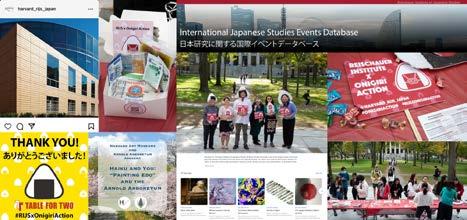
46
RIJS x Onigiri Action
During the fall semesters of 2020 and 2021, RIJS collaborated with Table for Two USA and Debra Samuels at Wa-Shokuiku to participate in “Onigiri Action,” a social good campaign during the month of October to celebrate World Food Day and raise awareness of food- and health-related issues around the world. In October 2020, RIJS took to Instagram to share onigiri photos and nominate other individuals and organizations to participate, including Harvard’s Japanese Language Program and MIT’s International Science and Technology Initiatives (MISTI) Program, while also spreading word about Japan-related language and research opportunities for undergraduate students. In October 2021, RIJS hosted several lunchtime information sessions, both in-person and virtual, culminating in a two-part “Onigiri in the Yard” event and “Reischauer Institute Presents Onigiri-Making” online cooking class presented by Debra Samuels, Gavin Whitelaw, and Jenni Ting.
RIJS x Haiku and You
In April 2021, RIJS joined the Harvard Art Museums and Arnold Arboretum in promoting Haiku and You, inspired by the exhibition Painting Edo: Japanese Art from the Feinberg Collection, which remained closed to visitors throughout the pandemic. In addition to a series of writing workshops and virtual tours of the exhibition and the arboretum, this campaign invited participants to share their own haiku for a poetry gallery, to which RIJS contributed several submissions from the Japanese Studies community.
International Japanese Studies Events Database (iJSED)
In October 2020, RIJS launched the International Japanese Studies Events Database (iJSED) in response to the Covid-19 pandemic and shift to online event programming undertaken at institutions and programs worldwide. The database aims to assist individuals all over the world interested in learning about and attending public events, as well as institutions looking to share their events with a broader constituency and further promote opportunities for intellectual engagement and community-building. Over the past two years since its inception, iJSED has listed over 600 events from nearly 100 organizing institutions.
RIJS on Google Arts & Culture
In March 2021, RIJS joined Google Arts & Culture to share several virtual collections based on exhibitions and projects of years past, including Mizue Sawano’s Eternal Return (2012), Tomokazu Matsuyama’s Palimpsest (2013), Yoshiaki Shimizu’s Irresolution (2017), and student-curated photography exhibition Bāba, Babushka (2020). The Google Arts & Culture page also feature a number of stories and student voices related to the 3.11 Great East Japan Earthquake and Tsunami, the Sanriku Project, and the Japan Disasters Digital Archive.
47
Fostering Networks in the Boston-Cambridge Community and Beyond
One of the greatest resources for Harvard’s faculty and students is the sheer concentration of knowledge and human resources relating to Japan in the greater Boston-Cambridge area. Because RIJS has long included area institutions’ scholars in its research activities, the networks linking Harvard faculty and students to scholars at nearby institutions are exceptionally vast. Harvard graduate students seek out faculty at local institutions for advice on their work and benefit from these scholars’ inclusion in RIJS activities. These networks lead to new ideas, academic jobs for Harvard graduate students, new faculty for Harvard, advice for Harvard College thesis writers, and access to data or archival resources elsewhere.
Associates in Research
Because of the mutual benefits for the research community at Harvard and the local Japanese Studies world, RIJS offers informal Associate-in-Research status to scholars and experts in various disciplines and fields relating to Japan. These scholars are based at MIT, Tufts University, Boston University, the MFA, and many other institutions, mainly in the Northeast region. Informal appointees receive library privileges and may attend Institute activities. These informal appointments are approved by the Executive Director after submission of a written application and curriculum vitae. Further, the appointments must be renewed annually. There were 202 Associates in Research during 2020-22. Please see the following pages for a complete list of RIJS Associates in Research, along with their affiliations and research topics.
Scott W. Aalgard
Wesleyan, Asst. Prof. of East Asian Studies
Singer-songwriters and critical praxis in modern and contemporary Japan
Marié Abe
BU, Asst. Prof. of Music
Intersection of sound, public space, and social difference in contemporary Japanese urban life through ethnographic analysis of chindon-ya
Marié Abe
UNC Chapel Hill, Research Collaborator, Dept. of Asian Studies
Social history of outcaste groups during the Tokugawa period
Barbara R. Ambros
UNC Chapel Hill, Prof. of East Asian Religions
Animals and religion in contemporary Japan; the life and teachings of a contemporary Shinshu healer
Galen D. Amstutz
Independent Scholar; Adj. Faculty, Inst. of Buddhist Studies
Transition of Shin Buddhism from Tokugawa to Meiji
Marnie S. Anderson
Smith, Assoc. Prof. of History
Social and political history of Meiji Japan
Anna V. Andreeva
Ghent, Research Prof. of Japanese Language and Culture, Dept. of Languages and Cultures
Japanese religions, cultural history, Buddhism, Shinto, history of medicine
Yuko Aoyama
Clark, Prof. of Geography; Assoc. Provost and Dean of Res., Office of Academic Affairs
Japan’s regional policy and role of aging population; social innovation and social entrepreneurship
Bruce P. Baird
UMass Amherst, Assoc. Prof. of Japanese
Butō, Japanese theater
Mikael Bauer
McGill, Asst. Prof. of Japanese Religions
Japanese premodern Buddhism and history
Jeffrey P. Bayliss
Trinity, Assoc. Prof. of History; Chair, Dept. of History
History and perception of Korean athletes who participated in Japanese sports during the colonial period
Thomas U. Berger
BU, Assoc. Prof. of Int’l Relations
The U.S. alliance system in Europe and East Asia in comparison
Rosemarie Bernard
Waseda, Asst. Prof. of Anthropology and Japanese Studies
Anthropology of religion and ritual; legal anthropology; Shinto; Ise Jingū; emperorship
Joanne R. Bernardi
Rochester, Prof. of Japanese and Film and Media Studies
Re-Envisioning Japan (digital humanities project); Itami Juzō monograph; two co-edited volumes (Japanese cinema, provenance and early cinema)
Laura E. Bernhart-Wong
Independent Scholar; FFD Koordinatorin, German Foreign Ministry
Informal Sino-German diplomatic relations
Victoria Lyon Bestor
North American Coordinating Council on Japanese Library Resources, Exec. Director
Library resources; development of new internetbased Open Source materials on Japan in support of undergraduate education
Phyllis Birnbaum
Independent Scholar; Writer
Biography of Okakura Tenshin
Herbert P. Bix
SUNY Binghamton, Prof. Emeritus of History
America’s path to perpetual war, 1820s-present
48
Thomas S. Blackwood
Tokyo International, Inst. for Int’l Strategy, Prof. of Sociology
Asylum seekers, visa-overstayers, and foreigners convicted of crimes in Japan
Verena K. Blechinger-Talcott
Free Univ. of Berlin, Prof. of Japanese Politics and Political Economy
Patterns of modernity in East Asia; collaborative project on the emergence of global governance due to epidemics
Mark L. Blum
UC Berkeley, Prof. of Buddhist Studies and Shinjo Ito Distinguished Chair in Japanese Studies Nenbutsu history; Edo-period Tannisho commentaries; seishinshugi philosophy in modern Japan
Robert Borgen
UC Davis, Prof. Emeritus of East Asian Languages and Culture
Heian Sino-Japanese cultural relations
Daniel Botsman
Yale, Prof. of History
Emancipation in 19th-century Japan; translations of recent work on Tokugawa social history
Ethan D. Bushelle
Western Washington, Visiting Asst. Prof., Dept. of Liberal Studies
The Mandalization of the World: Esoteric Buddhism and the Reconfiguration of the Classical Imaginary
Anne C. Buxton
Market Insights Director, EF Education First History of Japanese Americans who weathered the years of WWII on Japanese soil
Patrick Caddeau
Princeton, Dean, Forbes College
Study of ways in which environmental factors and critical inquiry have shaped national identity
Gavin J. Campbell
Doshisha, Prof. of American Studies
Transnational history of Japanese menswear, 1600-1935
Matthew M. Carlson
Vermont, Assoc. Prof. of Political Science Campaign finance; political corruption; scandals
Haeng-ja Sachiko Chung
Okayama, Inst. of Global HR Dev., Assoc. Prof. Semi-refugees, disaster, and marginalization
Ellen P. Conant
Independent Scholar
Continuation of reappraisal of lives/careers of Ernest/Mary Fenollosa
Ian Condry
Associates in Research 2020-22
MIT, Prof. of Comp. Media Studies/Writing Ethnographic study of music and musicians after the end of the recording industry: Tokyo, Boston, Berlin
Thomas D. Conlan
Princeton, Prof. of East Asian Studies and History
A study of the Ouchi daimyo house and their political, ritual, economic and social significance
Theodore F. Cook
William Patterson, Prof. of History; Director, Asian Studies Program
War and memory in shaping Japanese culture
Teruko Craig
Tufts, Sr. Lecturer Emerita in Japanese
Translating essays by Fukuzawa Yukichi
Michael P. Cronin
William and Mary, Assoc. Prof. of Japanese Studies
Alternate histories; Kansai region; 1995 in literature
Julia Cross
Yale, Postdoc Fellow, Council on East Asian Studies
Relic worship in medieval Japan; focus on the body, death; understandings of the sacred dead; how the dead are worshipped among the living
Jennifer Cullen
Northeastern, Lecturer, Dept. of Cultures, Societies, and Global Studies
Father-daughter incest in Japanese manga
Michael A. Cusumano
MIT Sloan, Sloan Management Review, Distinguished Prof. of Management
Japanese corporate entrepreneurship
Brett de Bary
Cornell, Prof. of Asian Studies and Comp. Literature
Translation as practice and theory in the works of Tawada Yoko, Morisaki Kazue, Lee Chonghwa, and Ukai Satoshi
Wiebke Denecke
BU, Assoc. Prof. of East Asian Literatures
History of early Japanese literary culture through Chinese and Korean eyes
Jennifer F. deWinter
WPI, Assoc. Prof. of Rhetoric; Director, Interactive Media and Game Dev. Prgm. Japanese game studies, game development; Urban renewal and sustainability in Kyoto
Frederick R. Dickinson
UPenn, Prof. of History
Global history of modern Japan
Rachel DiNitto
Oregon, Assoc. Prof. of Japanese Literature
Cultural responses to the 2011 triple disaster in literature, film, manga
Eric G. Dinmore
Hampden-Sydney, Elliot Assoc. Prof. of History
Monograph on resource anxieties in 20thcentury Japan, legacies of the co-prosperity sphere in Japan’s aid to Indonesia’s oil industry; monograph on Kurobe Dam
Sharon H. Domier
UMass Amherst, East Asian Studies Librarian
Reading techniques that will enable students to read authentic foreign language materials more confidently
James Dorsey
Dartmouth, Assoc. Prof. of Japanese
Japan in the 1960s; music and social movements; Japan’s wartime culture; translation
John W. Dower
MIT, Prof. Emeritus of History
American Century: War and Terror Since WWII
Fabian Drixler
Yale, Prof. of History
Demographic history and history of mentalities, especially with regard to social change in the 17th century
Edward R. Drott
Sophia, Assoc. Prof. of Japanese Religions
Buddhist medicine in premodern Japan; religion and the senses
Alexis Dudden
UConn, Prof. of History
The current trend toward territorialization of sovereignty through Japan’s island disputes
Steven J. Ericson
Dartmouth, Assoc. Prof. of History
Business reform in occupied Japan
Margarita Estévez-Abe
Syracuse, Assoc. Prof. of Political Science
Demographic aging, gender, social policy, electoral politics
William R. Farrell
Honorary Consul, Japan for Rhode Island
Currently representing Japan and lecturing at RI universities and colleges on Japan
Matthieu Felt
Univ. of Florida, Asst. Prof. of Japanese, Dept. of Languages, Literatures and Cultures
Reception of classical Japanese literature
William D. Fleming
UC Santa Barbara, Asst. Prof. of Japanese Literature
Early modern Japanese literature and reception of Chinese fiction in Japan
Lawrence A. Fouraker
St. John Fisher College, Assoc. Prof. of History
Political economy of interwar Japan
49
Associates in Research 2020-22
Matthew P. Fraleigh
Brandeis, Asst. Prof. of East Asian Literature and Culture
Sinitic literature (kanshi) in Edo/Meiji Japan; Japan-Taiwan cultural interaction
Sarah A. Frederick
BU, Assoc. Prof. of Japanese and Comp. Literature Book about Yoshiya Nobuko; digital humanities project on Natsume Soseki’s Kyoto
Nicole Freiner
Bryant, Assoc. Prof. of Political Science
Local responses to the repeal of the seed law in Japan
Naomi Fukumori
Ohio State, Assoc. Prof. of Japanese Depictions of ritual and ceremony as mise-enscène in mid-Heian period vernacular texts
Terence Gallagher Independent Scholar
Translation of Japanese texts to English (business, finance, legal, literary)
Timothy S. George
Rhode Island, Prof. of History
Toroku arsenic poisoning
William L. Givens
The Japan Fund, Former Chairman U.S.-Japan trade competition
Ryan S. Glasnovich
Brandeis, Instructor, Dept. of History
Development of Japanese police identity in the latenineteenth century
Carol Gluck
Columbia, George Sansom Prof. of History
Memory in hypernationalist times
Janet E. Goff
Independent Scholar
Famous fox characters in classical Japanese theater and their literary, religious, and historical impact
Yoshie Gordon
Boston Higashi School, Director of Development and Corporate Relations
Autism education in Japan and in the US
Robert D. Goree
Wellesley, Asst. Prof. of Japanese
Illustrated book genre of meisho zue and the popular geography of the late Tokugawa period
Peter Grilli
Japan Society of Boston, President Intercultural exchange
William W. Grimes
BU, Prof. of Int’l Relations; Assoc. Dean for Academic Affairs
East Asian financial cooperation, U.S.-JapanChina economic relations
Elizabeth ten Grotenhuis
BU, Prof. Emerita for Japanese Art; Head, Birches School
Received start-up grant to construct middleschool curriculum on immigration from China and Japan which she taught at Birches School
Tristan R. Grunow
Pacific, Visiting Asst. Prof. of Modern Japanese History
Empire by Design: Engineering Networks of Modernity in Tokyo, Taipei and Seoul
Christine M. E. Guth
Independent Scholar
Craft in early modern Japan
Mary Alice Haddad
Wesleyan, Prof. of Government; Chair, College of East Asian Studies
Environmental politics in East Asia and urban diplomacy
Kenneth Haig
Hokkaido, Research Associate; Sr. Director, Oracle Japan
Energy policy and and market innovation
William M. Hammell
Independent Scholar
Scholarly publishing, voiceover narration, international school culture
Jeffrey E. Hanes
Oregon, Assoc. Prof. of History; Director, Ctr. for Asian and Pacific Studies
Social history of occupied Japan
Walter F. Hatch
Colby, Assoc. Prof. of Government; Director, Oak Inst. for the Study of Int’l Human Rights
Politics of U.S. military basing in Asia and Europe
Tom Havens
Northeastern, Prof. of History
History of science in Japan and East Asia
Kenji Hayao
BC, Assoc. Prof. of Political Science
Changing impact of the prime minister in Japanese politics
Robert Hegwood
Independent Scholar
Role of Japanese Americans in U.S.-Japan cultural and commercial relations
Robert I. Hellyer
Wake Forest, Assoc. Prof. of History
Japan’s role in the global tea trade in the 19th and 20th centuries
Mariko I. Henstock
BU, Sr. Lecturer Emerita of Japanese
Assessing Japanese text readability for collegelevel Japanese language learners
Money L. Hickman
Independent Scholar
History of Parinirvana Imagery Japanese painter
Myoyo Kokan (1653-1717)
Junji Himeno
Keio Medical, Assoc. Coach of Kendo Club
The concept of kendo
Hosea Hirata
Tufts, Prof. of Japanese Literature
A study of Kobayashi Hideo
Allen F. Hockley
Dartmouth, Assoc. Prof. of Art History
Visual histories published during the Meiji Period
Hilary Holbrow
Harvard, Lecturer in Sociology
Changing stratification in times of demographic decline
Todd J. M. Holden
Bentley, Lecturer in Sociology
Japan 3/11
Saburo Horikawa
Hosei, Prof. of Sociology
Place, Preservation and Politics: A U.S.-Japan Comparison
Yusaku Horiuchi
Dartmouth, Prof. of Government and Mitsui
Prof. of Japanese Studies
Japanese public opinion, political behavior, Japanese politics, electoral politics
Christopher W. Hughes
Warwick, Prof. of Japanese Studies and Int’l Politics
Japan’s international relations and security policy
Takaharu Ichimura
Harvard Medical School, Instructor of Medicine
Study of Minakata Kumagusu and Miyatake Gaikotu
Kimberly H. Icreverzi
Independent Scholar
Postwar Japanese cinema; gender and labor
Evan S. Ingram
Chinese Univ. of Hong Kong, Asst. Prof. of Japanese Studies
Chogen and Shunjo’s interpretation and transference of Chinese Buddhism and culture to Japan
Charles Shirō Inouye
Tufts, Prof. of Japanese
The attractiveness of things (mono), a study of neo-animism
Rei O. Inouye
Northeastern, World Languages Ctr., Teaching Prof. of Japanese
Integrating popular culture into Japanese language pedagogy
50
Mari Ishida
Wake Forest, Asst. Prof. of Japanese Japanophone literature and the ideological visions of the multi-ethnic Japanese empire
James P. Ito-Adler
Association for Central Asian Civilization and Silk Road Studies, Exec. Officer
Adoption in Japan: A case study of fictive kinship
Christopher A. Ives
Stonehill, Prof. of Religious Studies
Zen approaches to nature and environmental ethics
D. Colin Jaundrill
Providence, Asst. Prof. of East Asian History
A multi-layered history of the 1868 battle of Toba-Fushimi
William D. Johnston
Wesleyan, Prof. of History
History of disease, epidemics, and public health disasters in modern Japan
Colin P. Jones
Postdoctoral Fellow, Max Planck Inst., Frankfurt
History of modern Japanese legal history from the perspective of political economy
Mark A. Jones
Central Connecticut State, Assoc. Prof. of History
Romantic love and marriage in interwar Japan
Jason A. Josephson Storm
Williams, Assoc. Prof. of Religion; Chair, Dept. of Religion
Japanese religions; East Asian philosophy; science and technology; philosophy of social science
Naoki Kamimura
Nanzan, Prof. of British and American Studies
Japan-U.S. security relations; U.S. policy toward the 1952 Bolivian Revolution
Ikumi Kaminishi
Tufts, Assoc. Prof. of Asian Art History
The history and politics of Japanese medieval emakimono
Miki Kaneda
BU, Asst. Prof. of Music
Transpacific musicology: race/gender/power in 20th- and 21st-century music
Nikhil Kapur
Rutgers-Camden, Asst. Prof. of History
1960 U.S.-Japan Security Treaty protests and their aftermath
Taizo Kato
Waseda, Prof. Emeritus of Psychology
Unhealthy nature of Japanese addictive relationships
Sachiko Kawai
USC, Postdoctoral Scholar, Dept. of History
Premodern Japanese history; women and gender; medieval estates; hot springs
Associates in Research 2020-22
Terry Kawashima
UMass Boston, Prof. of Asian Studies; Chair, Dept. of Asian Studies
Discourses of rebirth in premodern Japan
Adam L. Kern
Wisconsin, Prof. of Japanese Literature and Visual Culture; Director, Ctr. for Visual Cultures
Japanese literature and visual culture from 1600 to 1900
Masato Kimura
Kansai, Visiting Prof.
Shibusawa Eiichi’s thoughts and activities from the viewpoints of global capitalism and transnational relations
Takako Kishima
Waseda, Assoc. Prof. of Political Science
Transnational civic participation and digital activism: a case of “comfort women” movement
Aleksandra Kobiljski
Nat’l Ctr. for Scientific Research, Assoc. Prof. of Modern and Contemporary History
Engineering the Restoration: Envirotech History of Steel in Japan
Gabriele Koch
Yale-NUS, Asst. Prof. of Anthropology
Gender and sexuality; labor, rights, care
T. James Kodera
Wellesley, Prof. of Religion
Takashi Paul Nagai (1908-1951): radiologist, Roman Catholic convert, Hibakusha and Pacifist
Takeshi Kokubo
UMass Boston, Lecturer Emeritus on Japanese
A history of the Musashi Koku with emphasis on the influence of the Uesugi Clan
Keigo Komamura
Keio, Vice President; Prof. of Law
Constitutional law; constitutional politics; historical development of the Japanese constitution
Yukinori Komine
American Public, Assoc. Prof. of Int’l Relations
U.S.-Japan-China security relations over Senkaku/Diaoyu Islands disputes
Kimberly T. Kono
Smith, Assoc. Prof. of Japanese
Images of Japanese women in colonial Manchuria
Hiroko Kumaki
Dartmouth, Postdoctoral Fellow, SOF
Environmental health, science policy, and technological innovation in Japan
Thomas LaMarre
McGill, James McGill Prof. of Japanese Studies and Media Studies
Sciences and literature in Meiji Japan, on Sōseki, Ōgai, Tōson
Jinhee J. Lee
Eastern Illinois, Assoc. Prof. of Japanese History
Border-crossing women in transnational Japan and Koreans in the Japanese empire
Gary P. Leupp
Tufts, Prof. of History
Editing a large compilation of papers on Tokugawa Japan for Routledge Publishers
Andrew Levidis
Central Lancashire, Asst. Prof. of East Asian History
International history of the Japanese right-wing, historical rise of militarism, imperial thought
Adam P. Liff
Indiana, Asst. Prof. of East Asian Int’l Relations
International security in East Asia; Japanese security policy; U.S.-Japan-China relations
Mark E. Lincicome
Kyoto Consortium for Japanese Studies, Director Comparative study of national and regional identity formation in Japan and Australia, 1850-1950
Jennifer M. Lind
Dartmouth, Assoc. Prof. of Government
How countries develop economic and military power
Andrew Littlejohn
Robert and Lisa Sainsbury Fellow, Sainsbury Inst.
Post-disaster reconstruction and local identity in Northeast Japan
Andrew Littlejohn
Montreal, Asst. Prof. of Religious Studies
Religion and social work, prison chaplaincy, new religions
Terry E. MacDougall
Stanford Japan Ctr., Bing Overseas Prgm., Director Emeritus
Immigration, ethnicity, and citizenship in contemporary Japan
Edward T. Mack
Washington, Assoc. Prof. of Japanese
Japanese-language literacy activities in Brazil prior to the Second World War
Tamaki Maeda
Independent Scholar
Sino-Japanese artistic interchanges in the 19th and 20th centuries
Ayu Majima
Meiji, Sr. Asst. Prof. Socio-cultural history of modern Japan; cultural anthropology
Federico Marcon
Princeton, Asst. Prof. of East Asian Studies and History
Introduction of Western philosophy in 19thcentury Japan
51
Associates in Research 2020-22
Andrew L. Maske
Kentucky, Assoc. Prof. of Art History
Preparing an exhibition on Japanese women artists for Denver Art Museum, Sept. 2021
Thomas Mason
ALLEX Foundation, Exec. Director
Chinese and Japanese pedagogy, study abroad
Yoshihisa Tak Matsusaka
Wellesley, Prof. of History
Imperialism and the Nationalist Opposition in Late Meiji Japan: A Study of the Seikyōsha, 1888-1918
Reo Matsuzaki
Trinity, Asst. Prof. of Political Science
Institutional legacy of Japanese wartime occupation in Southeast Asia
Trent E. Maxey
Amherst, Assoc. Prof. of Japanese History
Cultural history of the automobile in 20thcentury Japan
Hiram James McLendon, Jr.
Independent Scholar
Sociocultural organization of a Japanese sogo shosha; Japan’s political economy
Sean H. McPherson
Bridgewater State, Asst. Prof. of Art History
Architecture and social history of spaces for Buddhist worship constructed by JapaneseAmerican communities
Matthew Mewhinney
Florida State, Asst. Prof. of Japanese Architecture and social history of spaces for Lyric poetry, lyric theory, literati culture, prose and poetry (premodern and modern)
Jennifer M. J. Milioto Matsue
Union, Assoc. Prof. of Music, East Asian Studies, and Anthropology
Cross-cultural comparison of religious dance in Bali and Japan; research on iconic Icelandic avant-garde artist Bjork
Richard H. Minear
UMass Amherst, Prof. Emeritus of History Tokyo University in the 1930s
Shigeru Miyagawa
MIT, Prof. of Linguistics
Linguistics; open education
Kuniko Miyanaga
Independent Scholar/Researcher
The Iconic Action- A society coded by rituals
Jiro Mizuno
Ritsumeikan Asia Pacific, Visiting Prof. of Japanese Diplomacy and Int’l Law
Japan and Iran, two friendly states and Iran’s nuclear policy
Robert H. Morehouse
Chairman, The December Inst.
The “Reverse Course”; American defense attorneys of Japanese accused of war crimes
Ryo Morimoto
Princeton, Asst. Prof., Dept. of Anthropology Fukushima nuclear disaster; decontamination; nuclear waste management; memory; archive
Kiyoko Morita
Tufts, Lecturer Emerita in Japanese Incense ceremony utensils found outside Japan
Carolyn A. Morley
Wellesley, Prof. of Japanese Literature and Theatre Buddhist nun plays in Noh and Kyōgen
James W. Morley
Columbia, Ruggles Prof. Emeritus of Political Science
Current affairs and U.S. policy
Anne Nishimura Morse
Museum of Fine Arts, Boston, William and Helen Pounds Sr. Curator of Japanese Art
Buddhist art and ritual practice; Japanese sheet music, contemporary photography, 1900-1950
Samuel C. Morse
Amherst, Howard M. and Martha P. Mitchell
Prof. of Art and History of Art
History of the sculpture of the Kamakura period, with a focus on its ritual context
Mark Mulligan
WIT, Assoc. Dean, Sch. of Architecture and Design
Modern/contemporary Japanese architecture and urbanism
Andrea Murray Independent Scholar
Book manuscript on tourism and environmental problems in Okinawa
Hiromu Nagahara
MIT, Assoc. Prof. of History
Cultural history of modern Japanese diplomacy, with focus on the inter-war period
Susan J. Napier
Tufts, Goldthwaite Prof. of Rhetoric
Finishing book on Japanese animation director Hayao Miyazaki
Jeffrey Niedermaier
Brown, Mulberry Essence Asst. Prof. of Japanese Literature
Boss Rule and Democracy in Post-Defeat Japan, 1945-1960
Emer S. O’Dwyer
Oberlin, Assoc. Prof. of History and East Asian Studies
Japan’s Postwar Democracy: The First Decade
Misako Ohta
Kobe, Assoc. Prof. Grad School of Human Development
Music and empathy during the occupation of Japan: A bicultural perspective
Halle O’Neal
Edinburgh, Chancellor’s Fellow; Lecturer of Japanese Art History
Buddhist palimpsests, medieval epistolary; death ritual; memory and embodiment; sacred paper
John C. Perry
Tufts, Fletcher School, Henry Willard Denison
Prof. of History
An imperial history of the China Seas
Samuel E. Perry
Brown, Assoc. Prof. of East Asian Studies
Japan’s Korean War; queer Korean literature
Lizbeth H. Piel
Lasell, Asst. Prof. of History
Childhood in wartime Japan
Joan R. Piggott
USC, Gordon L. Macdonald Prof. of History and East Asian Languages and Cultures
Book manuscript “Visions of Heian Kyoto” and collection of annotated translations “Obe Estate and its Residents—the World of a Medieval Estate”
Tamae K. Prindle
Colby, Oak Prof. of East Asian Languages and Literature
Shintoism in Nakamura Ryūtarō’s anime, (shinrei-gari 2007-08)
Aaron P. Proffitt
SUNY Albany, Asst. Prof. of Japanese Studies
East Asian and Japanese Buddhism, Esoteric Pure Land Buddhism in medieval Japan
Ronald Richardson
BU, Assoc. Prof. of History
Popular Movements and the Opening of Japan
Amanda Robinson
Independent Scholar
Japanese animal cafes, human-animal relations, sociality in Japan, affect economy
Paul Roquet
MIT, Asst. Prof. of Japanese Studies
Cultural politics of virtual reality and immersive media in Japan
Brian D. Ruppert
Bates, Hirasawa Prof. of Japanese Studies; Chair, Asian Studies Prgm.
Cultural history of Buddhist scripture in Japan
Atsuko Sakaki
Toronto, Prof. of East Asian Studies
Sports narrated, Trains of intensities, Photographic books as sites of translation
52
Richard J. Samuels
MIT, Ford Int’l. Prof. of Political Science; Director, Ctr. for Int’l. Studies
Japanese security policy
Ernesto F. Sanz
UMass Lowell, Prof. Emeritus of Economics Trade changes between the European Union and Japan
Minae Savas
Bridgewater State, Assoc. Prof. of Japanese Studies; Chair, Dept. of Global Languages and Literatures Monogurui or madwoman motif in the Japanese Noh Theatre
Janine T. A. Sawada
Brown, Prof. of History of Japanese Religions Lay mountain religion in early Tokugawa Japan
Ellen Schattschneider
Brandeis, Assoc. Prof. of Anthropology and Women’s, Gender and Sexuality Studies WWII memorialization and ritual processes; material culture; trauma theory
Sachi Schmidt-Hori
Dartmouth, Assoc. Prof. of Japanese Literature Representations of gender, sexuality, class, and (pseudo-) kinship in premodern Japanese prose narratives
Frank J. Schwartz
Showa Boston Inst., President International education in Japan
Amanda C. Seaman
UMass Amherst, Prof. of Japanese Literature Illness narratives (fictional and non-fictional) in postwar Japan
Vyjayanthi R. Selinger
Bowdoin, Assoc. Prof. of Asian Studies
Legal imagination of medieval literature
Franziska Seraphim
BC, Assoc. Prof. of Modern Japanese History
Geographies of Justice: Japan and German war criminals in the postwar world, 1945-1958
James M. Shields
Bucknell, Assoc. Prof. of Comp. Humanities and Asian Thought
Progressive and radical Buddhist thought and practice in East Asia, especially Japan
Yumiko Shimabukuro
Columbia, Lecturer of Int’l and Public Affairs; Director of Urban & Social Policy Prgm. East Asia’s brewing social welfare crisis and the decline in human capital/labor
Toru Shinoda
Waseda, Prof. of Social Sciences
Trans-pacific history of industrial democracy among Japan, China, and the United States
Associates in Research 2020-22
Eiko M. Siniawer
Williams, Prof. of History
Global history of 1973
Daniel M. Smith
Columbia, Visiting Assoc. Prof. of Modern Japanese Politics and Foreign Policy
Japanese politics, comparative politics, political economy, and political behavior
Kerry Smith
Brown, Assoc. Prof. of History
Disasters, disaster science, and earthquake prediction in 20th-century Japan
John P. Solt
Independent Scholar
History of Japanese visual poetry
Amanda M. Stinchecum
Independent Scholar; Hosei, Inst. for Okinawan Studies, Research Assoc.
Changing parameters, expressions, meanings of a sash from the Yaeyama Islands: legend, history, identity
Sarah M. Strong
Bates, Prof. Emerita of Japanese Language and Literature
Ainu oral traditions, animism in the works of Miyazawa Kenji, haikai traditions
Shizuko Suenaga
Seattle, Sr. Instructor of Japanese Japanese war brides today
Noriko Sugimori
Kalamazoo, Assoc. Prof. of Japanese Language ideology, language policy; sociolinguistics, honorifics; critical discourse analysis; corpus linguistics
Ronald Suleski
Suffolk, Prof. of History
Using hand-written materials to reconstruct life for the common people of China from 1850-1950, including Japanese materials
Rebecca M. Suter
Sydney, Assoc. Prof. and Chair of Japanese Studies
Comparing Australian and Japanese beverage consumption cultures
Paul L. Swanson
Nanzan, Inst. for Religion and Culture, Permanent Research Fellow
Translating 6thcentury Tiantai Buddhist texts
Paul D. Talcott
Independent Scholar
The spread of market mechanisms in health care policy in Japan and East Asia; the relationship between economic development, democracy, and the introduction of market principles into social insurance systems
Wako Tawa
Amherst, Prof. of Asian Languages and Civilizations; Director of Language Study
Japanese grammar for learners of Japanese as a foreign language
Sarah Thompson
MFA, Curator of Japanese Art
Japanese prints in the MFA collection, especially ukiyo-e woodblock prints
R. Kenji Tierney
SUNY New Paltz, Lecturer of Anthropology
Sumo; food; globalization; sports; the body
Maria Toyoda
Suffolk, Dean of College of Arts and Sciences
Macroprudential financial regulation; material attributes and infrastructure complexity
Alice Y. Tseng
BU, Assoc. Prof. of Art History; Chair, Dept. of History of Art and Architecture
Modern Kyoto art and architecture; imperial portraiture and spaces; history of exhibitions and collections
Yolanda A. Tsuda
Kobe, Prof. of Global Studies
Religion and migration in Japan
Mary Evelyn Tucker
Yale, Sr. Lecturer and Sr. Research Scholar
Religion and ecology; book “Thomas Berry and the Arc of History” (2019)
Timothy J. Van Compernolle
Amherst, Prof. of Japanese
The creative exchanges between literature and cinema in interwar Japan
Floris van Swet
Northumbria, Postdoc Research Fellow
Social and political consequences of attainder in early Tokugawa Japan
Elena Varshavskaya
Rhode Island School of Design, Senior Lecturer
Ukiyo-e prints as historic documents
Alexander M. Vesey
Meiji Gakuin, Assoc. Prof. of Global & Transcultural Studies
Early modern Japanese Buddhist social history
James Keith Vincent
BU, Assoc. Prof. of Japanese and Comp. Literature
Natsume Soseki and Masaoka Shiki; haiku and the novel
Louise E. Virgin
Independent Curator of Japanese Art
Shijo surimono with emphasis on their included haiku and the haiku poets who composed them
53
Associates in Research 2020-22
Mitsuyo Wada-Marciano
Carleton (Ottawa), Prof. of Film Studies
Post-Occupation Cinema, especially the 1950s Japan; “Japan” in the cultural discourses after 3.11
Mariko N. Walter
Independent Scholar, Exec. Director of ACANSRS
The Silk Road: Interwoven History, vol. 2 Buddhism
Garrett L. Washintgon
UMass Amherst, Asst. Prof. of History
Social impact of urban, built, and social spaces of Japanese Protestant Churches, 1879-1923
Takeshi Watanabe
Wesleyan, Asst. Prof. of East Asian Studies
Pre-Edo representations of foodways through text and image
Robert Weiner
Naval Postgrad. School, Lecturer in Political Science
Comparative/domestic politics of Japan, the Koreas, East and Southeast Asia
Victoria Weston
UMass Boston, Assoc. Prof. of Art
Okakura Kakuzo in his international context; Meiji-period Tokyo nihonga
Merry White
BU, Prof. of Sociology and Anthropology
Ethnographic research on “work” in Japan in food from domestic to artisanal to industrial work
Ellen B. Widmer
Wellesley, Mayling Soong Prof. of Chinese Studies
A 17th century Chinese poet; Dual identity of a Chinese revolutionary woman; How biographies of heroines made their way from America to China via Japan
Michael A. Witt
INSEAD, Prof. of Strategy and International Business
Varieties of capitalism, de-globlalization, comparative corporate governance
David Wittner
Utica, Prof. of East Asian History
Meiji industrialization, visual and material culture
Aida Yuen Wong
Brandeis, Assoc. Prof. of Asian Art China-Japan relations and transnationalism; Nakamura Fusetsu and his circle of Japanese calligraphers who popularized metal-and-stone aesthetic in late 19th and early 20th centuries
Tadashi Yamamoto
Independent Scholar
Japanese mythology and coronations; computational intelligence; food culture
Emi Yamanaka
BU, Sr. Lecturer in Japanese Language pedagogy; second language acquisition, technology in education
Kikuko Yamashita
Brown, Assoc. Prof. of Japanese Studies
Historical background of Buddhist writings used in the medieval temple schools
Midori Yoshii
Albion, Prof. of Int’l Studies
Japan’s role in the JFK/LBJ era U.S. policy toward Taiwan
Anna M. Zielinska-Elliott
BU, Master Lecturer in Japanese; Director, BU
Translation Initiative
History of translation of Tanizaki’s “Kagi” around the world
Eve Zimmerman
Wellesley, Assoc. Prof. of Japanese Trope of girlhood in modern Japanese literary culture
54
Administration
Through 2020-22, the Institute was administered on a day-to-day basis by the individuals listed below. Due to limitations caused by Covid-19, there were no Japan Summer Student Program Coordinators or Student Assistants during this time.
Reischauer Institute Staff
›› Director Mary C. Brinton
›› Executive Director Gavin H. Whitelaw
›› Assistant Director Stacie Matsumoto
›› Assistant to the Director/ Mizuka Yasuhara (2020-21) Event Coordinator
›› Graduate Program Coordinator Catherine Glover
›› Undergraduate Program Coordinator Wei-Hsuan Jenni Ting
›› Project Coordinator Hannah Perry
›› Financial Assistant Yitsy Ooi
›› Japan Digital Scholarship Librarian Katherine Matsuura
›› Japan Digital Project Manager Sachie Shishido
57 55
 Cover image: 2020-21
RIJS Holiday Card Photo “teamLab Borderless” (Tokyo, Japan) Diane Lee, Harvard Class of 2020
Cover image: 2020-21
RIJS Holiday Card Photo “teamLab Borderless” (Tokyo, Japan) Diane Lee, Harvard Class of 2020


 Edwin O. Reischauer, pictured here with his wife, Haru.
Edwin O. Reischauer, pictured here with his wife, Haru.
























































 Cover image: 2020-21
RIJS Holiday Card Photo “teamLab Borderless” (Tokyo, Japan) Diane Lee, Harvard Class of 2020
Cover image: 2020-21
RIJS Holiday Card Photo “teamLab Borderless” (Tokyo, Japan) Diane Lee, Harvard Class of 2020